#and I interpret those issues from a characterization perspective as a manifestation of the fact that he’s an adult with a child’s heart
Explore tagged Tumblr posts
Text
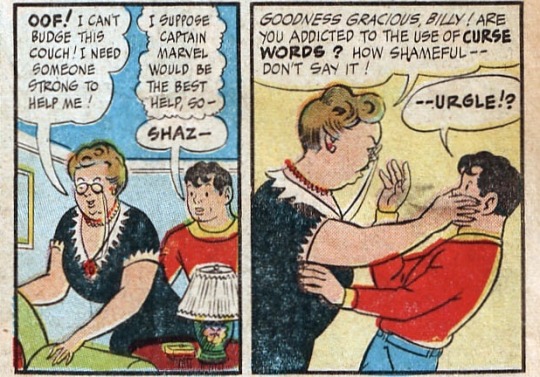

Captain Marvel Adventures (1941) #45
#not Billy’s true nemesis- parenting#I actually think it’s really interesting how Captain Marvel’s issues with women go beyond being freaked out when they hit on him#he’s legitimately afraid of and avoids overbearing aggressive women#and he takes that you shouldn’t hit women to a comical level that creates problems when he has to fight female criminals#which is treated like a legit weakness as not as a respectable thing#this is a part of the comedic ethos of the character’s stories#which takes the approach that you don’t have to take the character seriously all of the time#and so doesn’t avoid making him look goofy even though he himself is not a goofy wise-cracking person#and I interpret those issues from a characterization perspective as a manifestation of the fact that he’s an adult with a child’s heart#which is different from just being a regular adult#so while he’s not an immature person he has some immaturity that’s unique to him#because Billy does not have those issues with women and has poked fun at Captain Marvel for them before#this story is making clear to me that Billy can have his own issues with overbearing women#in the form of being uncomfortable with being parented#which tracks from how this version of him was orphaned as an infant and then raised by an abusive and neglectful uncle#who eventually abandoned him after stealing his inheritance#so Billy has no positive associations with parenting and is ok with taking care of himself#his positive relationships with adults are with the best big brother ever Captain Marvel and his employer Sterling Morris#as well as the Wizard Shazam who’s mentoring could be framed in a parental light but is in actuality very distant from Billy#and not involved in his day-to-day life#wait now I’m thinking about how all of those characters are men and how Billy reacted to Mary getting the power of Shazam too#which was to be like but Mary can’t have the powers because she’s a girl which demonstrated a strong belief in gender roles#that was then affirmed by the story revealing that she actually had her own distinct different girl powers#and then he had a story in which he was essentially wrestling with his own assumptions about women’s minds#like that they were naturally suspicious and therefore that their suspicion about something was not to be taken that seriously#and his deep adoration for and faith in his sister which did ultimately win out when she was proven right and also saved him#fawcett comics#billy batson#my posts#comic panels
16 notes
·
View notes
Text
Adora might be autistic too
Alright, most people in the SPOP fandom agree that Entrapta is autistic, as her coding is extremely obvious. However, some of us also believe that our beloved protagonist Adora is on the spectrum as well. She comes off as quite the aspie, and while Asperger’s is no longer a diagnosis in the DSM-V (but is in other manuals), it falls under the blanket diagnosis of Autism Spectrum Disorder (ASD) and its diagnostic criteria is still useful in analyzing people for signs of the disorder. In analyzing Adora’s character I will refer somewhat to both disorders, with the understanding that Asperger’s is a specific manifestation of ASD.
I would like to preface this by saying this is a headcanon and people are free to disagree with me. Some of these characteristics I’m going to bring up could also manifest because of her very sheltered upbringing in a cult-like atmosphere or mental illnesses such as anxiety and complex PTSD (both of which she arguably has). I am autistic myself, so obviously I am inclined to interpret these symptoms this way, but to each their own. It’s also worth noting that Adora has a lot of symptoms that cross over with AD(H)D, a cousin disorder to ASD, and it’s totally possible she has both.
In any case, there is now enough evidence hinting at Adora’s neurodivergence (especially now that the Rebel Princess Guide has been released) that I feel the need to explain this theory in detail instead of just occasionally mentioning it. So here goes...
She’s naive/easily manipulated
This one doesn’t really need explaining, we’ve all seen it. Adora assumes people are telling the truth because why would anyone lie to her? That is such a relatable spectrum feel. She was handily brainwashed by Shadow Weaver in the Horde, while some of the others didn’t seem to swallow the propaganda so easily. This is of course partly because of the special attention and affection Adora got from Shadow Weaver, but she had to be vulnerable to manipulation in the first place for it to work.
Later, she trusts Huntara easily in the Crimson Waste despite Bow and Glimmer’s warnings about her questionable character. Adora happily follows her into a trap even once Bow and Glimmer tell her they're going the wrong way, reasoning it’s probably a shortcut rather than reevaluating her misplaced trust. This can be partly explained by how she‘s gay af for Huntara, but still.
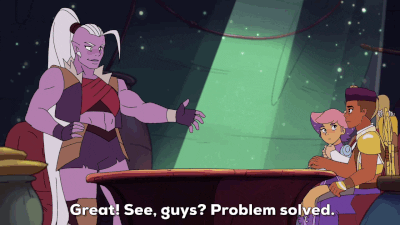
(Interestingly, the episode cuts straight from this moment to the obviously autistic Entrapta going against her own friend's advice and refusing to give up on the portal machine despite the obvious warning sign of Hordak’s violent dismissal. Parallels, much?)
Her difficulty understanding other points of view
A lot of Adora’s conflict with Catra is predicated on misunderstandings, and she has a hard time understanding the effects her actions have on other people, Catra in particular. For instance, she misunderstands Catra talking about ruling the Horde together as being purely about power, while Catra’s actual goals are safety and Adora’s companionship. That miscommunication is not just Adora’s fault, but it illustrates that she has difficulty understanding other people’s needs and motives without being explicitly told.
This isn’t just a problem with Catra, either. In general Adora has a difficult time understanding other’s motives and feelings. For instance, she doesn’t understand Glimmer’s insecurity over Bow’s friendship with Perfuma at Princess Prom, and she can’t fathom why Entrapta would choose to work for an evil faction, going so far as to assume she must have been brainwashed into it. This is because, just like with Catra, she doesn’t understand that some people’s priorities are not the same as hers.
Autistic kids tend to reach developmental milestones at different times than neurotypicals, sometimes being way ahead and other times falling behind. One such marker that is usually slower to develop and often stays impaired is theory of mind, our ability to a) understand that other people have different perspectives and b) understand those perspectives. Adora’s difficulties being able to put herself in someone else’s shoes definitely lines up with this symptom.
She’s clumsy
For someone so athletic, Adora sure lacks coordination. This is a commonly cited symptom of people with Asperger’s, though it shows up in people with other forms of ASD too. In general, autistic people often have difficulty with fine and/or gross motor skills, and this can lead to being accident and injury prone. According to Catra in 3x05, Adora bumps her head a lot. That may have just been a callback to 1x01, but either way clumsiness has been part of her characterization since the beginning, one of her many loveable, adorkable qualities.
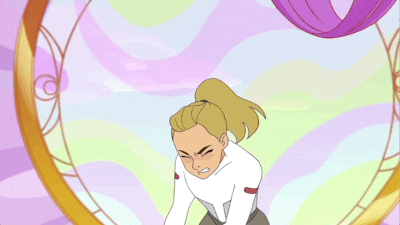
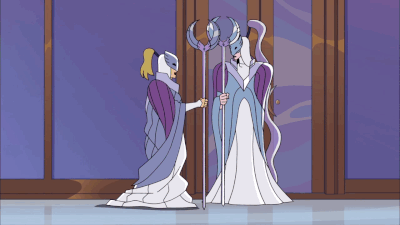
Her lack of social and self awareness
Adora can be painfully oblivious to her own inappropriate behavior. There’s several examples of this throughout the series, one of the more costly ones coming at Princess Prom. Shocked by Frosta’s youth, Adora fails to register how maybe this (in front of Frosta, with all eyes on her) is not the time to remark on it. She immediately realizes this was the wrong thing to say (or at least not something she should shout), but that small delay causes both her and Glimmer a lot of embarrassment.
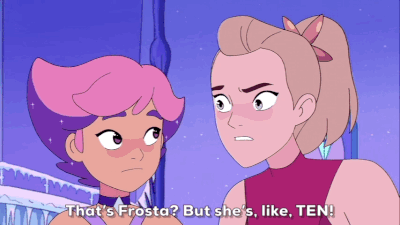
Part of the issue here is that she loses control of her volume, which in itself is a common problem for those of us on the spectrum. This isn’t the only time we see her have this problem, either, and it’s amplified (tee hee) when she’s drunk/infected.
More generally, one of the funniest examples of Adora’s poor social awareness comes when she barges into Huntara’s flirtation with the bartender in the Crimson Waste. She’s so focused on her task of recruiting Huntara that it doesn’t even occur to her that this is an intimate moment and intruding would be rude.
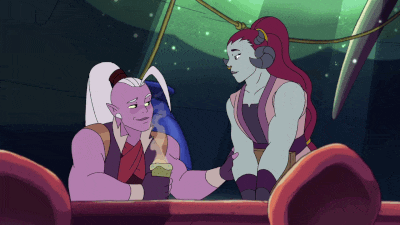
In the Rebel Princess Guide Adora also says she wishes Queen Angella would let her make some adjustments to the uniforms of the Bright Moon guards, which implies she tried to make these suggestions already. Maybe she figured She-Ra could suggest anything, but as both a newcomer and a royal subject that’s a bit of a faux pas. Chances are, that went right over Adora’s head.
She can’t read a room to save her life (literally)
This is another, more specific aspect of social awareness. Adora has difficulty picking up on the implicit rules (social norms) when she enters unfamiliar situations, and has a tendency to step on toes because of it. She also doesn’t understand when her friends try to nonverbally communicate what she’s doing wrong, and nonverbal communication deficits and problems with social awareness and insight are two major symptoms of ASD. One specifically listed example is “difficulties adjusting behavior to suit social contexts”, including:
Lack of response to contextual cues (e.g. social cues from others indicating a change in behavior is implicitly requested)
Unaware of social conventions/appropriate social behavior; asks socially inappropriate questions or makes socially inappropriate statements
Here’s a couple specific example of times where Adora misses or misunderstands nonverbal cues to change her behavior:
At her first Rebellion meeting she doesn’t realize that maybe she shouldn’t sit in the special-looking chair, and doesn’t clue in that that’s why everyone is freaking out.
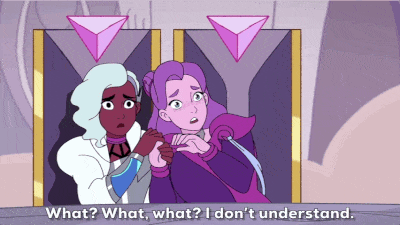
In the Crimson Waste, Glimmer responds to the growling bar patrons surrounding them by suggesting that maybe these aren’t the kind of people they should be asking for help, but Adora persists. She jumps up on the bar and makes a speech trying to get directions (which is socially inappropriate for the context as well as dangerous), somehow missing all the scowls from the patrons as well as Bow and Glimmer’s wild gesturing.
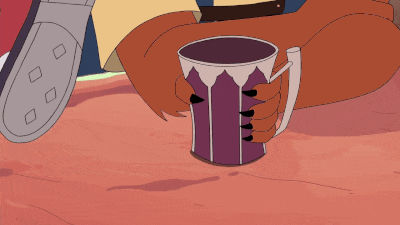
Panic over unfamiliar social situations
Adora’s anxiety about going to Princess Prom could be attributed to many things, not just a spectrum disorder. Her obvious anxiety, for one, though to be fair there’s a high comorbidity between the two disorders. In any case, it seems the unfamiliarity of the situation is a sticking point for Adora in particular, while Bow and Glimmer are nothing but excited for their first ball.
Adora’s anxiety seems to stem mostly from being overwhelmed by the prospect of entering a new social situation with a whole bunch of unfamiliar rules to remember. She’s still learning behavioral norms outside of the Horde, and this is a huge jump up in terms of difficulty for her fledgling social skills.
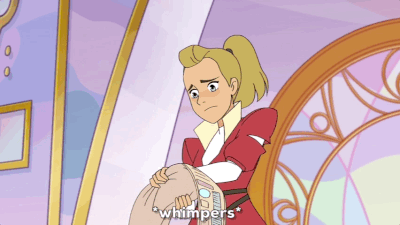
To cope with her stress she goes overboard trying to prepare by making a conspiracy board of sorts, flash cards, and an obstacle course. And at the ball itself, it seems like she’s even rehearsed how to behave.
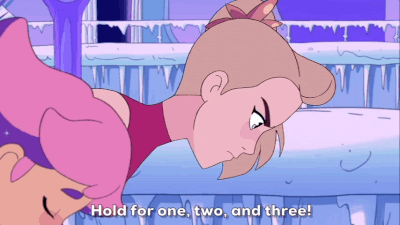
This probably isn’t only relatable to autistics, but it’s very relatable to us. Creating and rehearsing behavioral scripts is a common strategy to avoid embarrassing ourselves in public. Unfortunately, as we saw above, this works for about five seconds before Adora botches the whole thing by commenting on Frosta’s age.
Extreme stress over details
In general, Adora is a very anxious, perfectionistic person who hyperfixates on details, a very autistic trait. As mentioned above, this is wonderfully illustrated by her overpreparation for Princess Prom. She’s broken down the overwhelming list of rules in the invite into categories to make it more manageable, gone into detail categorizing people’s relationships to each other, and learned trivia about the guests in order to feel more prepared. Yet, somehow she missed the important fact that the hostess is only eleven years old.
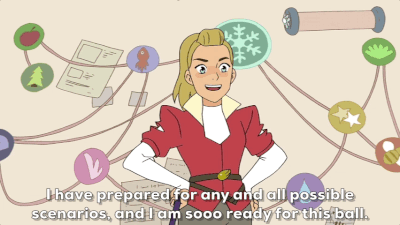
Unfortunately this hangup doen’t only affect her, but also her friends and allies. The overarching theme in “Roll With It” is how debilitating Adora’s anxiety and perfectionism can be. Her eye for detail and ability to see flaws in plans is actually very valuable, but she gets so hung up on every possible thing that could go wrong that she can’t accept imperfect solutions with calculated risks.
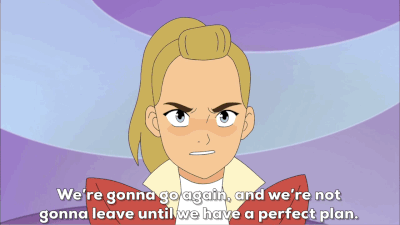
Her propensity to be overwhelmed by too much information (like with the Princess Prom invite) shows up here too. Adora grows more and more frustrated and overwhelmed as more princesses join the planning session, adding more variables to deal with and more people to manage. She begins lashing out and shooting down every possible solution that doesn’t satisfy her need for perfection immediately. Her behavior looks like it may be headed for a meltdown until it culminates in an epic rant revealing all her anxiety and how it ties into her insecurities about her own imperfection.
Thankfully her friends are able to reassure her that she has support and doesn’t have to be perfect, but it’s an ongoing battle, one we already saw her struggle with in “Flowers for She-Ra” and “The Battle of Bright Moon”. It’s a strong tenet of Adora’s personality that is proving difficult to shake.
What she misses about the Horde
The recently published Rebel Princess Guide contains a list by Adora of things she misses about the Horde, and this list screams neurodivergent. I’ll go through it point by point, since there’s a lot to unpack here.
THINGS I MISS ABOUT THE HORDE
1. I miss the rigid schedule. It never changed, and I always knew what to expect.
Ritualistic behavior and an insistence on sameness are often seen in individuals with ASD. In fact, it’s a major symptom. Many of us have diifficulty adjusting to changing schedules, changes in diet, or even minor changes in our environment (such as placement of objects, boy do I have stories there). We need warning when things are going to change, and even if we know it’s coming it’s still a struggle to adjust.
2. I miss the constant sound of machines and whirring. In Bright Moon, there’s always music playing, or people laughing, and birds singing. It’s nice but it makes it hard to focus!
Autistic brains process sensory information differently from neurotypicals, that’s basically our disorder at its core. Over or under reactions to sensory input are common and in fact considered a major symptom, and this entry of Adora’s specifically refers to difficulties with sensory filtering. We have a hard time filtering out information that’s irrelevant to our current task, which makes us easily distractable.
3. Believe it or not, I miss my hard cot in the barracks. My bed in the castle is way too soft!
This ties into both the insistence on sameness and sensory issues.
4. Catra… sometimes.
This isn’t autistic, it’s just gay.
Speaking of which...
She’s gay
Adora's relationship with Catra has always been queer-coded, but any doubts about her sexuality were dispelled in season 3 by the way she fawns over Huntara like a baby gay over her gym teacher. Her obvious queerness might seem unrelated to the topic of autism, but those of us within the community can attest there’s probably just as many queer people among us as there are cishets. It’s so notable that there has been quite a bit of scientific research confirming people with ASD are more likely to be LGBT and gender atypical and exploring the cause of this link.
(This needs no proving at this point, but enjoy these gifs anyway...)
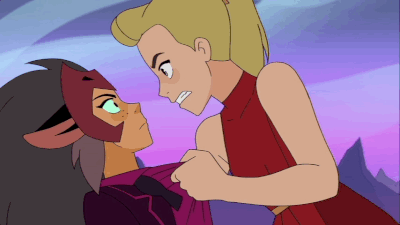
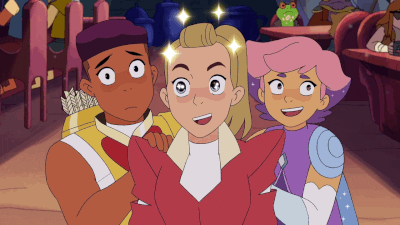
In conclusion
Overall, there’s a lot of hints and circumstantial evidence suggesting Adora could have ASD. Was this the creators’ intent? Hard to say. Adora is the protagonist and one of the most developed characters, so she’s definitely not a cardboard cutout or checklist for ASD symptoms (compare that to Entrapta, a secondary character whose behaviors can often easily be attributed to autism). It’s totally possible the creators just characterized her as naive and awkward and obsessive without realizing the implications of that cluster of traits together.
Regardless of authorial intent, it’s perfectly valid to look at Adora and see representation of the ASD community. The groundwork is there. And if someone else looks and doesn’t see it, or sees something else causing this behavior, that is also fair. No one is forcing anyone to accept this headcanon (or at least they shouldn’t be), but in return please don’t disparage it. Even if she is not autistic Adora is definitely autistic-coded, and we could use some more heros with the disorder, given how we’re mostly relegated to being villains and anti-heroes (not that there’s anything wrong with us filling those roles sometimes, but a little variety would be nice).
Adora is often referred to as a dumbass, but she’s actually quite intelligent, just sometimes slow to understand how she should act and how people feel. Still, she tries her hardest, just as she does with everything else. Adora is heroic and compassionate, even if she sometimes struggles to understand others. When autistic-coded characters are so commonly portrayed as cold and unforgiving, Adora is a sorely needed exception.
1K notes
·
View notes
Note
Why do You dislike Scott Snyder? I mean I have my reasons.. like a lot of the Court of Owls stuff, his convoluted plots, making Dick a punching bag for the broody bats, horrible at writing the family as a family he literally wrote Death of the Family I mean....*kill bill sirens* ... Also the ''son of a Damian'' line from Black Mirror etc. But I'm curious if you have more reasons since I'm pretty new and I'm told that he likes Dick and wanted to write Dick focused books and I don't.. buy it.
LOL yeah, all of that for sure, and I mean.....tbh, I don’t pay enough attention to his interviews and stuff to even be aware that he’s said that about liking Dick and wanting to write Dick-centric books, but I’m with you on that....not necessarily meaning anything.
God knows I’ve lost track of how many fic writers in this fandom swear up and down they love Dick Grayson and yet I avoid their stories with extreme energy, lmao, because I’ve read enough of their takes on DG that I’m like hmmm, yeah, we are not the same, lol. I mean, there’s a certain couple fic writers who just are like....DETERMINED to mention Danny Chase every single time I make a post about why I’m annoyed by the focus on Dick’s allegedly infamous temper. And its always the exact same song on repeat, they’re like “OH-HO, so apparently you don’t remember the time Dick choked Danny, a literal CHILD, just because Danny had the nerve to tell him Jason died, cuz like, I do, and it was AWFUL and Danny could have died TOO y’know, that’s how mad Dick was.”
And then I just kinda stare at these words that apparently mean things, and enter a fugue state where an unknown amount of time passes and by the end of it I feel 80 million epochs older, and its like....no, I absolutely do remember that time when Dick grabbed Danny by the shirt and yelled in his face because he just found out his brother died and Danny said “what’s the big deal, its not like it doesn’t happen all the time” and this was absolutely not an awesome and fun scene for anyone, no matter how understandable Dick’s upset was at the time. BUT, I also happen to remember, since y’know, it was in that literal exact same issue, how then Dick went to see Bruce, and due to BRUCE’S upset about Jason’s death, Bruce literally punched his remaining son to the ground, screams about how it was all Dick’s fault, and kicks him out of the house Dick grew up in and tells him to leave his keys with Alfred.
And its like......the very same people who LOVE to throw around references to Danny Chase in order to puff up the claims about Dick Grayson being volatile and extreme and having a Dangerous Temper like, flat out REFUSE to ever even ACKNOWLEDGE that scene with Dick and Bruce, from the literal exact same issue, because they at the same time claim that THIS was bad writing and OOC and Bruce would never.....but apparently, the writing from ten pages before it was just fine and completely accurate and Dick absolutely would not only ever, he would always, and thus Dick’s Legendary Dangerous Temper is canon and its why Dick can’t have nice things or people being nice to him in these writers’ stories, its too Dangerous, he might get mad I guess.
And each time this comes up on this site, I’m always like....hey, science side of tumblr, is it possible that insisting on vilifying Dick for his reaction to someone in the wake of Jason’s death whilst simultaneously refusing to acknowledge the scene of Bruce’s reaction to Dick is canon or in-character despite existing in the exact same issue and written by the exact same writer.....like....could this be one of those double standards I’m always going on about? And isn’t it in fact reasonable to question just how much or how little someone actually means it when they say they love a character but want that character flogged in the middle of the town square for a Bad Reaction to something that also prompted a Bad Reaction from another character but this character, they’ll like, throw themselves in front of a moving train if it keeps someone from daring to even suggest that THEIR reaction was canon and in-character and might potentially say something damning about their temper or behavior with friends or family?
*heaves endless sigh of endlessness*
Sorry, that example was right there on the tip of my brain today because like....I literally just saw another post around this oft-deceased and resurrected and killed to death again dead horse like, five minutes ago and then came to dip into my ask box for the first time today and it was like.....destiny. Assuming destiny has some free time to kill and nothing better to do, which, I mean, hey, everyone’s allowed a hobby is all I’m saying.
LOL sooooooooooo, ANYWHO, its just like.....ugh, I’m so over being expected to take at face value any writers, whether professional or fan, saying “oh but I love this character or that character, and due to that being my preface to everything else I say or do in regards to this character, you have zero basis for claiming that you do not like or trust my depiction of this character because ummm, read much? I literally JUST said, I love them though? Wow. Insert scoffs of incredulity here, I don’t even know how to talk to someone who thinks I don’t like a character I claimed I like just because literally everything else I say or do about them paints an opposing picture to the contrary.”
LMAO. Sorry. Had to get that off my chest. But yeah, like, I think EVERY canon Batfam writer has made a similar claim in recent years about pretty much every Batfam character, and at a certain point it starts to be like....okay, if all of you are telling the truth here, shouldn’t we see more canon evidence of like....these characters that you’re writing, like....actually even LIKING each other? At what point are we allowed to question the legitimacy of you saying oh I totes love this character, that’s why I write their family as abusing them, that’s just love, baby, that’s what it looks like.
Personally, I’d like to see more of us at least using qualifiers? I mean, I do say I don’t hate Tim, or Bruce, or any of these characters, but I get how people could be dubious about that and be all, umm, you rant about them a lot, because like...yeah. Fair. That’s a valid critique. SO its a lot more accurate for me to be like, I love 90s Tim and I just have become increasingly less enchanted with the character over the past twenty years since then, enough so that my knee-jerk reactionism to people bashing Dick’s character BECAUSE of what Dick did or didn’t do to Tim in their eyes, is like.....disinclined to view the situation or his character these days through 90s-Tim rose-colored glasses.
Similarly, I truly don’t hate Bruce, at least not when he’s not being written as physically and emotionally abusive and/or just plain neglectful, BUT I absolutely despise the abuse apologism rampant in most fandoms, but particularly in this one, where people will make like Cirque-de-Soilei contortionists in order to prove that Bruce beating this kid or that kid isn’t actually abuse, its cuz they made him do it....rather than people just being like, no, that’s abuse right there on the page and I don’t stand for it or stan that Batman, so I have zero desire to defend that scene or his actions there from his perspective, and am totally fine with taking a seat when someone speaks up about how much they hate what Bruce did to his kid there in that scene and how it affects their read of the characters as a whole.
Its like....that too, is a thing you can do, instead of just.....trying to explain why Bruce isn’t abusive see, because what happened there wasn’t actually abuse, since it couldn’t have been, because Bruce isn’t abusive, see, he would Never.
And yet so rarely do people actually do that, and we have people literally championing themselves as members of the Good Dad Bruce Protection Squad when the frank reality is there CAN BE NO GUARANTEE of him ever and always being a Good Dad, when like....his characterization, ultimately, is dependent on how he’s written by canon writers who ARE NOT US. Which makes that desire to see him as just a good dad and nothing but a good dad always, like....not quite as understandable as it otherwise might be, and instead just kinda....willful, an admission that a lot of fans in this fandom will just flat out ignore all evidence to the contrary of this stated claim about what Bruce inherently IS, when inherently all he is happens to be a character who manifests whatever those in creative control of him choose to manifest via him. Like.....there are ways to go about that kinda thing, its just....that isn’t it. Something like “Proud member of the Keep Bruce Wayne a Good Dad Squad’ or something along those lines? I’d have ZERO issue with, because that’s ACTIONABLE, not WILLFUL. It posits not that Bruce simply IS this way and there’s no ifs, ands or buts about it, but rather that just because he isn’t this way in some instances, that doesn’t mean we have to agree with it or condone that interpretation of him, y’know?
But people are like....unwilling to make that distinction or hold that nuance a lot of the times, so my dislike of Bruce as he’s written in certain ways or by certain writers like....grows and evolves and mutates into Godzilla rampaging through downtown New York, until its understandable that people reading my blog intermittently and who don’t follow everything I say on the subject are like.....”Bold of you to claim you like lizards in this one post when I have here nine other posts where you’re just like, FEAR the murderous monster-lizard destroying New York for it is Dangerous and Fearsome. Cuz one of these things is not like the others, bud.”
*Shrugs* Anyway, all of that’s just my allergy to Staying on Topic, so make of it what you will, hopefully you get what I mean though even if you don’t have like, the requisite Kalen-Garbled-Nonsense Secret Decoder Ring. Back to Snyder though....yeah, he can claim he likes Dick all he wants, because y’know what, Tynion says the same thing and its been well established by moi that my fondest wish for Tynion is that he be kept far, far away from Dick’s character whenever possible. And I’m pretty sure Tom King claims he loves all these characters and we’re all like HAHAHHAHA and we know Lobdell insists he loves Jason Todd and its like wow how curious then that hardly any other Jason Todd stans love you.
The ironic thing about my random bouts of ugh Snyder in a lot of posts however, is that......tbh, its not even his depiction of Dick that makes me dislike him as much as I do? LMAO. I mean, I’m not a fan of it personally, for a lot of the reasons you mentioned, but I don’t like a lot most canon writers’ depiction of Dick these days and haven’t for years. The thing I really dislike Snyder for, personally, is his depiction of Damian.
Its just.....its very Not Good, a lot of the time. Oh, there are moments here and there, but you could claim that for any writer, really, but for the most part, like.....ooof, I haven’t read Snyder’s work on Damian recently enough to really cite specific moments off the top of my head, because I’ve been avoiding anywhere he’s writing Damian for awhile now BECAUSE of it, but....a LOT of the ‘demon brat’ shit in regards to Damian comes from Snyder’s work, and like, I’m always kinda like “hey is making Demon anything the go-to nickname for a kid of Arab descent who is already compared to a terrorist enough as it is like....really the best we can do” to begin with, and Snyder absolutely 100% does not help with that.
To be fair, its not remotely like its all just on him, the stuff that has had a lot of us complaining for years about the blood son crap and the insistence on acting like there’s this stark divide between Bruce and Damian and the rest of the Bat siblings, I mean, see: Tom King again, its just. Ugh, okay, Im gonna have to get back to this in the near future with actually sourced gripes about why I think Snyder’s Damian in particular is absolute crap and could he just not, though. Because it really is my chief complaint with him, like I was never gonna be a fan of his in general just because he’s someone who's like DARK MULTIVERSE BATMAN FUCK YEAH and I’m someone who’s like DARK MULTIVERSE BATMAN UGH FUCK WHY.....lol....BUT like I mention in other posts.....its not like he’s incapable of doing decent stuff or that he’s never written anything I like, because ironically, he IS the biggest canon backer of Duke Thomas and pretty much single-handedly responsible for Duke retaining as much of a presence as he has in recent years instead of just appearing and blipping out of existence like a one-hit wonder, and that can’t be overlooked or considered inconsequential.
That just also kinda makes it all the more annoying that his Damian is so very.....objectionable to me, but yeah. Anyway, that’s the curious case of my very mixed feelings on Scott Snyder, with a side dish of generalized “lol oh, so you do in fact love this character? Well magically all my criticisms of your take on them have now disappeared!”
11 notes
·
View notes
Text
It Chapter Two: Aged-Up Protagonists and the Umbridge Effect

Writing reviews, metas, and the like is a lot about timing. If you don’t craft your writing in the immediate aftermath of your source’s release, someone else will beat you to it and, chances are, your audience will be less enthused about reading the same arguments weeks later. (Admittedly, that’s up for debate. I for one am happy to read about the same shit for years on end.) Thus, when I didn’t have the time or the mental energy to write about It: Chapter Two immediately after seeing it in theaters, I knew within a few days that I’d lost a lot of ground. Fans and critics alike have already spoken about the film’s major draws, namely the update on Richie’s sexuality and the canonizing of a beloved, thirty-year-old ship. We’ve also covered the issues that arose out of those positives. In 2019, is it necessary to show a hate crime in such violent detail? By giving us queer characters, have Muschietti and King unintentionally fallen into the trap of treating them badly? One is dead and the other mourns while the straight couple passionately kiss beneath the lake. Faithful adaptation vs. modern activism is a tricky balance to strike. I could rehash all those arguments here, but why bother? They’ve been articulated better by others already. Besides, falling behind means that I now have the space to discuss something just as important to me.
The Losers’ ages.
Now, I’m not sure if you all have noticed, but fantasy adventures aren’t really geared towards adults. That is to say, stories often contain adult content, but that’s not the same thing as putting adults at the center of the narrative. I’ve experienced a niggling sense of displeasure that’s grown stronger with each passing year and it took until my mid-twenties to figure out what it was: I am no longer the hero of many of my favorite stories. Because I’ve grown up. Harry Potter is concerned primarily with the trials and tribulations of characters between the ages of eleven and eighteen. If we return to that world---such as through a certain cursed play---the focus must shift to the new, shiny generation. Anyone who falls through a wardrobe is bound to be a child and if they dare grow up? They’re no longer allowed access to such a fantastic place. Kids are the ones who find the Hundred Acre Woods, or fall down rabbit holes, get daemons, battle Other Mothers when the world gets flipped, or head off onto all sorts of elementary and high school adventures. Sometimes, even those who are adults mistakenly get caught up in this trend. Frodo might be in his fifties, but as a small, kindly hobbit he comes across as younger than the rest of the Fellowship. Since the release of Jackson’s trilogy I’ve corrected more than one new fan who assumed (somewhat logically) that he is in his early twenties, max. It’s an easy mistake to make when we’ve grown accustomed to children and young adults taking center stage in so many fantastic, high-profile adventures.
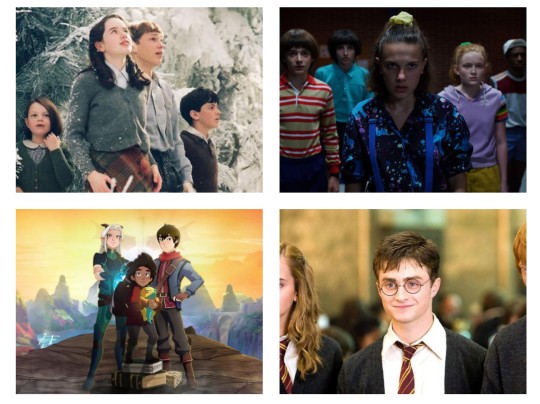
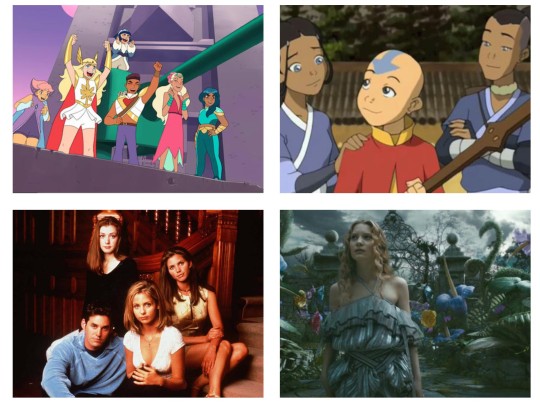
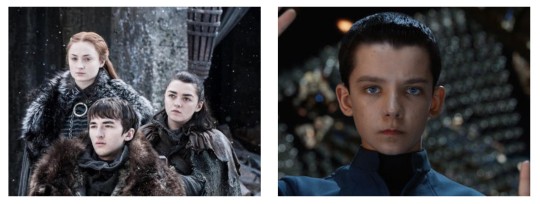
Of course, there are plenty of counters to this feeling. Just look at Game of Thrones. Though we see much of the story through younger perspectives---such as the Stark siblings---the vast majority of the cast is made up of adults, playing just as pivotal a role as the up-and-comers. Fantasy, Science Fiction, and other speculative story-lines are by no means solely in the hands of minors, yet I think it’s also worth acknowledging that a good majority of those stories do shape our media landscape. Or, if they’re not strictly minors, they’re characters who embody a sort of static young adulthood, the Winchesters and the Shadowhunters and all the television superheroes who might gesture towards markers of adulthood---we have long term relationships, hold down jobs, can impersonate FBI agents without anyone batting an eye---yet are still able to maintain a nebulous form of youth. They all (try to) look and act as if they’re right out of college. The standards of film and television demand that actors appear twenty-years-old even when they’re pushing forty, and the standards of much literature insists that twenty is simply too old for an adventure, period. I can still clearly recall two moments of shock (later agreed upon by my friends) when I encountered unexpectedly older protagonists in genre fiction: the realization that Sophie actually spends the majority of Howl’s Moving Castle as a very old woman and that The Magicians takes place in graduate school. “Wow,” I remember thinking. “When’s the last time that happened?”

What does all this have to do with It: Chapter Two? I don’t have any big twist for you here. It was just really refreshing to see such a fantastical story where our cast is all forty or older. Seriously, can we take a moment to appreciate exactly how much King undermined expectations there? The first half of the novel is structured precisely how we assume it ‘should’ be. There’s a mysterious threat, there are children caught up in the middle of it, and ultimately only they are capable of saving the day. We know this story. We even have the characterization of the town itself to reinforce this structure, a place so warped by evil that only the very young with their open-mindedness and imagination are capable of seeing Derry for what it truly is, illustrated beautifully in the film by Mr. Marsh straight up not noticing a whole room full of blood.
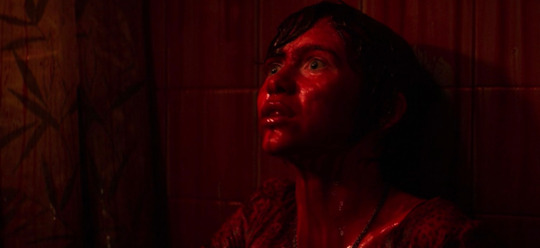
Though they’re It’s prey, children are also the only ones who have any potential power over him. You have to be able to acknowledge a problem in order to fix it and King could have easily ended his story at the first chapter alone, with the group somehow managing to defeat Pennywise for good the first time they set foot in the sewers. A part of me is still shocked he didn’t, if only because the young savior as an archetype was embedded within Western culture far earlier than It’s 1986 publication. From Carrie to The Girl Who Loved Tom Gordon, Pet Sematary to Firestarter, King is no stranger to putting children at the center of fantastic tales. Yet he’s also given us numerous adult protagonists, managing to find an enjoyable balance between the two, both within individual novels and his entire corpus. It represents that balance, not just imagining a story where seven (yes, I’m counting Stan) middle-age adults manage to finally save their town, but actually setting up a twenty-seven year jump to allow for that. It's the best of both worlds, exploring the difficulties inherent in both childhood and adulthood, arguing that we need each---that imagination and that experience---if we hope to come out alive.
While watching It: Chapter Two I took note of how many people laughed throughout the film, and not just at the moments set up to be funny (looking at you, Richie). Rather, the film that two years ago had scared the pants off of movie-goers now entertained them in a much more relaxed manner. No one was hiding behind their popcorn; there were no shrieks of fright. I’ve seen more than one reviewer express displeasure at this change. What the hell happened? Isn’t an It film supposed to be scary? Well, yes and no. I think what a lot of people miss is how providing us with an adult cast inherently changes the way fear manifests, both literally in the case of Pennywise’s illusions and thematically in regards to the film itself. This sloppy bitch, as established, preys on children. His tricks have the illogical, fantastical veneer that reflect how children see the world: you’re scared of women with horrifically elongated faces, zombie-like lepers, and hungry mummies. They’re literal monsters emerging out from under the bed. Of course, as adults watching the story we’re easily able to see how these monsters represent much deeper, intangible fears: growing up and disappointing your father, falling ill like your mother always claims you will (to say nothing of contracting AIDS in connection with a budding queer identity), and the danger that comes with being alone and ostracized. Sometimes It: Chapter One gestures more firmly towards those underlying fears---such as the burnt hands reaching for Mike when we know his family died in a fire---but only once does it make the real horror overt, when Pennywise takes Mr. Marsh’s face and asks Bev if she's still his little girl.
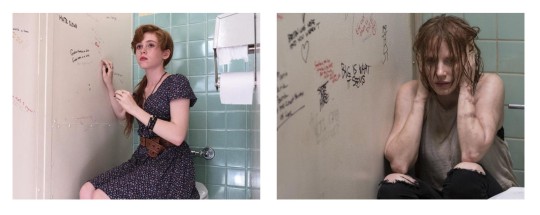
Outside of pedophilia and sexual abuse, Chapter One’s real horror is mostly coded, symbolic, left up to (admittedly rather obvious at times) interpretation. It’s just under the surface and we’re meant to be distracted by the fact that, allegorical or not, there’s still a very creepy thing hunting our protagonists from the shadows. For two hours we take on a child’s perspective, biting our nails at all the things we once imagined hid inside our closets. We’re scared because they’re scared.
That mindset irrevocably changes once your group grows up. Forty-year-olds simply don’t freak out in the same way a bunch of thirteen-year-olds would, especially now that they know precisely what’s happening and have the mental fortitude to combat it. At least to an extent. Chapter Two isn’t as traditionally scary for the simple reason that the film now acknowledges what all adults eventually must: there’s nothing in the closet, there’s nothing hiding under your bed. Or if there is, it’s something tangible that can be handled with a calm(ish) demeanor and a well-placed ax. An adult might scream when something jumps out at them, but they’re not as inclined to cower. Adults might still be scared, but they’re better able to push that fear aside in order to take action. The group first reached that point in the sewers--- “Welcome to the Losers’ club, asshole!”---and now fully embodies that mindset with nearly three decades of growth and experience to draw on. This is why Ben investigating the library as a teen reads as teeth-chatteringly scary, but Ben and Bill as adults investigating the skateboard produces only a comment about how they're getting used to this nonsense. They know, and we as the audience know, what the real threat is and whether or not we need to shield our eyes when something starts clunking its way down the stairs.
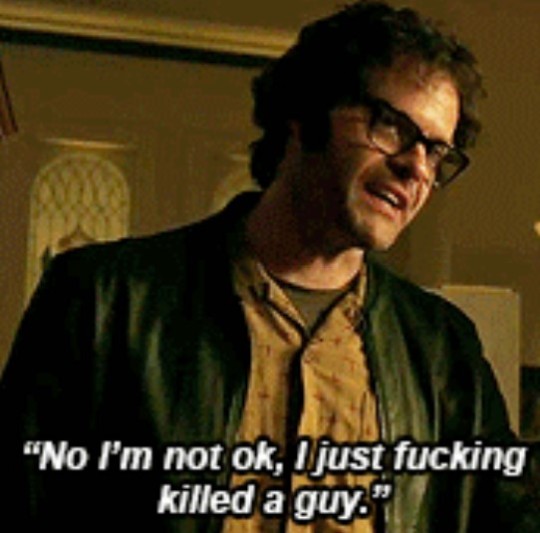
All of which isn’t to say that Chapter Two isn’t scary. It’s simply scary in a much more realistic manner, killer clowns and Native American rituals aside. The fears have been aged-up along with the cast, stripping away the child-like fantasies that made us wet our pants in Chapter One. What’s the scariest moment outside of the jump scares? When two men and a kid beat a gay man and then chuck him in the river to drown. You’ll note that, unlike in the first film, Pennywise doesn’t actually have to do much work here. Seasoning people up with fear? The rest of the world is doing that for him. That first scene detailing a truly horrific hate crime (which, by the way, is based off of true events) results in a meal delivered straight to Pennywise’s arms. It’s people who targeted that couple, beat one of them within an inch of his life, and then tossed him over a bridge, bleeding and shrieking for help. All Pennywise had to do was scoop him from the water and take that first bite. He’s incidental to the film’s most cringe-worthy scene. We can argue all we want about how it’s Pennywise’s influence that “makes” the town this way, but any queer viewer knows that's simply not the case. In 2019 we're still living this horror, no Pennywise required.
Likewise, the two children we see murdered are much more overtly grappling with fears that have nothing to do with fantastical monsters. Dean, the little boy Bill tries to save in lieu of Georgie, is rightly petrified because a seemingly crazy adult is now stalking him. We as the audience know that Bill is just trying to help----that he’s not the real danger here----but that’s not the perspective this kid has, nor is it the issue the film is grappling with. We first see him approaching an idol of his, Richie, and instead of an enjoyable experience he winds up getting yelled at. The It films are only tangentially interested in the status of fans and their relationship with celebrities, but we know it’s a common theme for King’s work overall. Look at Misery and look at this cameo: a disenchanted fan of the 21st century, criticizing a writer’s novel and leveraging him for money. “You can afford it,” he tells Bill, swindling him simply because he can. The context of this little boy as a fan and Richie as the older, bigger, larger-than-life comedian adds another layer to the interaction. It’s not just an adult verbally attacking a child, it’s an adult this kid worshiped enough to recognize and quote his material from memory. Who easily walks away from that?
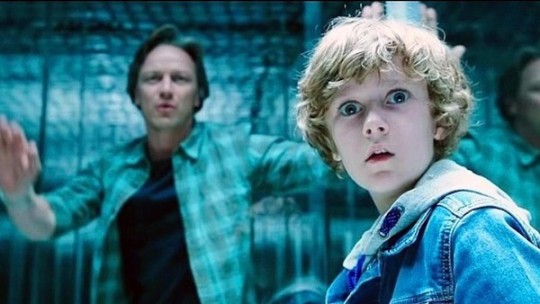
This little boy then finds Bill shrieking at a sewer opening, is manhandled by him, and told in the scariest way possible, born of Bill’s own fear, that he has to get out of dodge, fast. There are scary things out there, Dean freely admits that he’s heard kids’ voices coming from the tub drain, but right now the scariest thing is how badly the adults in his life are failing him: parents (from what little we can gather) are distant, his comedic idol is mean, and now this stranger is traumatizing him in the middle of the street. Once again, it’s easy to see how Pennywise isn’t needed to sow fear or even enact cruelty; he’s not a requirement for horrible things in the world, he��s merely their reflection. We see the same setup with the little girl under the bleachers. That scene demonstrates precisely how not scary Pennywise is. Here’s this child putting aside her discomfort over his looks and agreeing to be his friend. What’s worse than a clown with a creepy expression? The knowledge that all the other kids have already rejected you because of a birthmark on your face. Bullying is the far greater threat and one we’re 100% more likely to deal with in our lives than a killer clown, so the second film re-frames Pennywise to better acknowledge this. He’s scary because things like bullying and neglect exist to give him an easy in. He’s even scary because in this moment, hiding under the bleachers, manipulating this little girl, he’s fully embodying a child predator. Chapter One was a primal, “There’s a monster hiding in the shadows” kind of fear. Chapter Two is a, “We’re all going to die from climate change” kind of fear. Logical and largely inescapable. Characters like Richie don't need Pennywise to take some fantastic form to scare him. Homophobia has already done all the work.
Ultimately, I think of this as the Umbridge Effect. Who’s the most hated character in the Harry Potter franchise? I’ll give you a hint, it’s not the Dark Lord responsible for two wars, attempted genocide, and the death of our title character.

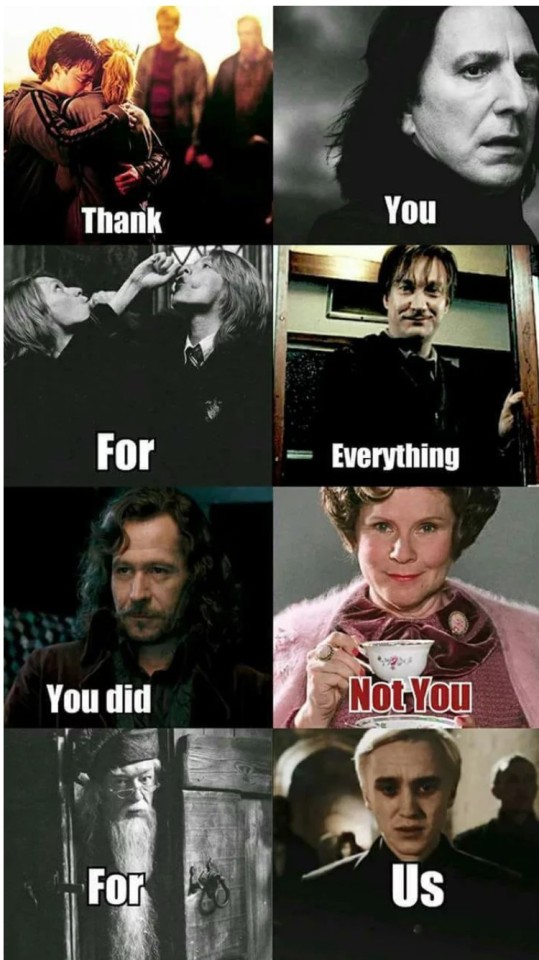

We despise Umbridge because she’s real. She’s relatable. She’s grounded in a way that Voldemort could never hope to be. We have no fear that an all-powerful sorcerer is suddenly going to come out of the woodwork and attempt to enslave and/or eradicate everyone without magic. That’s just not on our list of things to worry about. A corrupt politician, however? An instructor who uses her power to emotionally and physically torture students, getting away with it because of a cutesy, hyper-feminine persona? We’ve seen stuff like that. We’ve lived it. Umbridge represents all the real wrongs in the world when it comes to bigotry and privilege. Therefore we hate her---we fear her---in a way we could never hate or fear Voldemort. Now, in It: Chapter Two, Pennywise is the new Voldemort. Is an alien clown with an unhinged jaw and three rows of teeth technically scary? Sure, but it doesn’t hold a candle to the real problems that plague the cast: abuse, anxiety, depression, suicidal ideation, the fear that someone will hurt or outright kill you over some part of your identity. These are things we continue to fear long after the credits roll and the lights come up, and they’re now barely coded in the story:
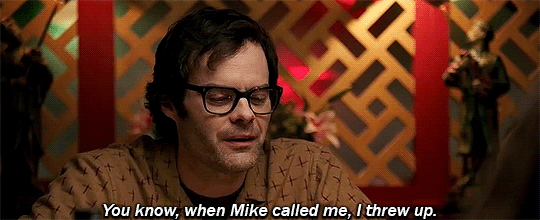
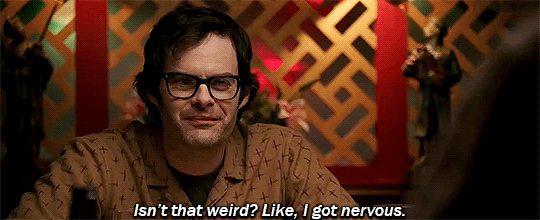
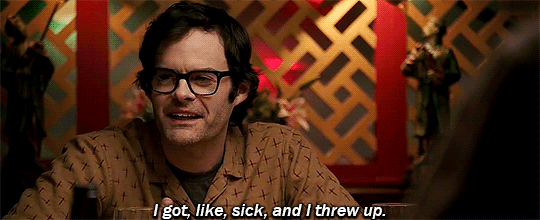
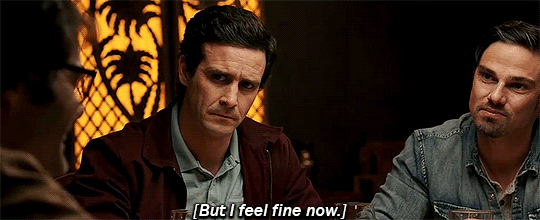
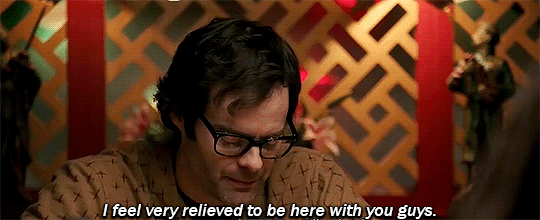
It occurred to me halfway through my viewing that the people laughing at the characters’ new plights were the same ones who didn’t flinch when a gay man’s head cracked into the pavement. I had both hands over my mouth during that scene and I wasn’t snickering whenever Eddie had a panic attack, or Ben’s self-confidence took a hit. Because those moments, like our opening, hit pretty close to home for me; I didn’t find them embarrassingly humorous in the way much of my theater did. So many reviews in the last two months have insisted that Chapter Two isn't scary, but I think that depends entirely on whether or not you're struggling with these now explicit threats. We're not dealing with mummies and creepy portraits anymore. Instead, tell me how you feel about holding your partner's hand in public. Do certain memories make you vomit? Or freeze? Consider heading upstairs to the bath? The horror is dependent on how the audience views Bill's stutter coming back, or the bruises on Bev's arms.
The cast grew up. It’s a fantastic twist. It also means that the horror needed to grow up with them, resulting in a film that could no longer function as a simple, scary clown movie. Our ending reminds us of that. When did people laugh the loudest? When the Losers’ club was bullying Pennywise into something vulnerable. And yeah, I get it. It’s a cheesy moment that we feel the need to laugh at because it’s just so unexpected. Awkward, even. Since when are badass horror monsters defeated with a bit of backyard peer pressure straight out of middle school? If this were any other story, Pennywise would have been defeated by Eddie’s poker. The most scared member of the group finally finds his courage! He has faith that this simple object can kill monsters! He throws it in a perfect arc, splitting the deadlights in two! That’s a heroic ending. Something epic and fantastical, relying on the idea that the Good Guys will win simply because they believe in themselves... but that’s not how the real world works. That ending is a child’s fantasy. Sometimes you do the heroic thing and end up dying anyway. Which isn’t to say that the heroic thing is useless. It saves Richie’s life. It’s just that a single act can’t cure all our ills in the way that storybooks often claim they can.
How then does an adult deal with huge, intangible problems like bigotry and mental illness---the things Pennywise now fully represents? By saying “Fuck you” to those things again and again with all the support you can possibly wrangle up at your side. You refuse to let those issues control you; you drag those child-like representations into the light and remind yourself just how small they really are. We don’t get to beat something like depression by spearing it with a fire poker in some overblown finale. If we did, we’d all be having a much better time. All you can do is band together with friends and scream that you’re not going to let your fears define you anymore. Pennywise is a symptom of all the true horrors in the world. Sadly, you can’t beat those with a baseball bat. But you can acknowledge the heart of the issue, literally in the case of five friends squeezing until that one symptom, at least, is gone.
Image Credit
#1:https://www.screengeek.net/2018/07/10/it-chapter-2-character-mashups/
#2:https://earlybirdbooks.com/the-re-read-the-lion-the-witch-and-the-wardrobe
#3:https://www.vox.com/culture/2019/7/4/19413771/stranger-things-season-3-review-recap-hopper-elevenrussians
#4:https://comicbook.com/movies/2019/08/08/harry-potter-movies-review-10-years-late-snape-dumbledore-franchise/
#5:https://www.denofgeek.com/us/tv/netflix/277257/give-the-dragon-prince-a-chance
#6:https://www.forbes.com/sites/lindamaleh/2019/04/23/she-ra-and-the-princesses-of-power-season-2-review/#ec7022c42953
#7:https://www.commonsensemedia.org/tv-reviews/avatar-the-last-airbender
#8:https://www.newsweek.com/buffy-vampire-slayer-turns-20-charisma-carpenter-shows-enduring-legacy-and-566123
#9:http://theinspirationroom.com/daily/2009/alice-in-wonderland-the-movie/
#10:https://www.hindustantimes.com/tv/game-of-thrones-this-edited-out-scene-between-bran-and-sansa-reveals-so-much-about-finale/story-qFDHflH2dO6Kcki1wgsEyM.html
#11:https://www.cinemablend.com/new/Why-Ender-Game-Best-Possible-Adaptation-Book-40110.html
#12:https://www.hollywoodreporter.com/live-feed/supernatural-end-season-15-cw-1196579
#13:https://www.slashfilm.com/it-chapter-two-scene/
#14:https://www.vox.com/culture/2017/9/12/16286316/it-cleaning-up-blood-scene-feminism
#15:http://www.allocine.fr/film/fichefilm-208633/photos/detail/?cmediafile=21647122
#16:https://stanleyyuris.tumblr.com/post/188300897715/chaotic-losers
#17:https://whatculture.com/film/it-chapter-2-every-character-ranked-worst-to-best?page=3
#18:https://www.reddit.com/r/harrypotter/comments/7uhrkz/the_most_hated_character/
#19:https://9gag.com/gag/am2X2Z4?ref=pn.mw
#20:https://screenrant.com/harry-potter-hated-characters-unpopular-worst-ranked/quickview/17
GIFs1-5:https://the-pretty-poisons.tumblr.com/post/188344826978/why-is-everyone-looking-at-me-\like-this
71 notes
·
View notes
Note
what do you think about the prophecy? "He is the one who shall bring an age of darkness upon the world" what does this mean? is griffith really going to turn out being the bad guy( I hope not) or guts is going to change this prophecy somehow? (because he should have been a sacrifice but he is alive?) also why does schierke call griffith false?
Ok so I re-read a bunch of scenes relating to the prophecy to try to come up with a decent answer, and honestly I think I might’ve been better off just going “idk probably depends on your pov” lol.
But I came up with some things to say and I’ll try to lay out my thoughts in a somewhat organized way here, so bear with me.
At the end of the Eclipse, Slan is all, now that the fifth angel is here the time of darkness descends. Then she defines exactly what the Age of Darkness will entail:



Soon Farnese shows up and recites the prophecy. This also happens right after the Eclipse, before the Black Swordsman arc will have taken place, two years before the next time we see these guys:
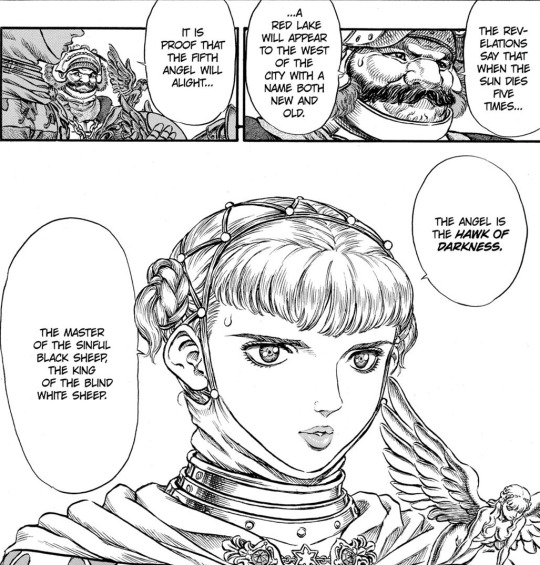


The fifth angel, the Hawk of Darkness, pretty obviously Femto. There’s no mystery here.
And honestly, the Age of Darkess is pretty explicitly discussed during the Conviction Arc. There’s really no mystery there either, at least not yet.
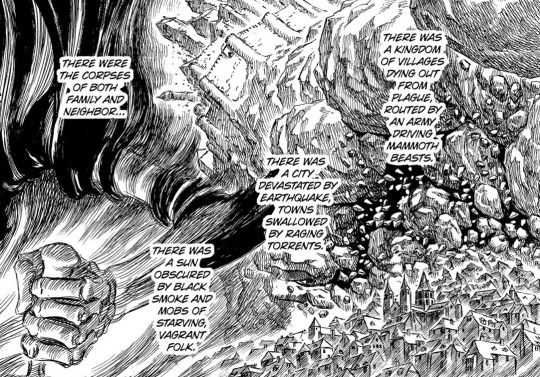
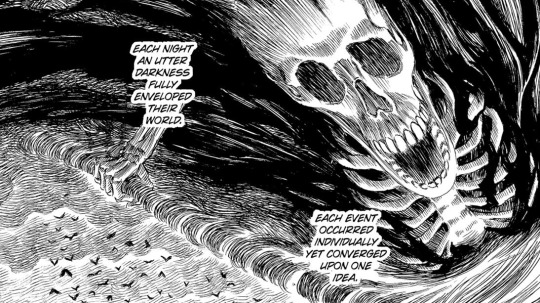


(I’m relatively certain that last line is essentially identical to “they sensed intuitively” from NGriff’s resurrection, and which I’ve also seen translated as “knew,” and so I wouldn’t put too much stock in the word “believed” there as purposefully leaving room for doubt, just fyi.)
Like, this is hammered in over and over. This prophetic dream of plague and natural disasters and war and famine, followed by Laban bemoaning the state of the world as these events come true and he encounters a landslide and a village full of plague, and we see tens of thousands of starving refugees outside the Tower of Conviction, and Kushan war elephans make an early appearance, etc.

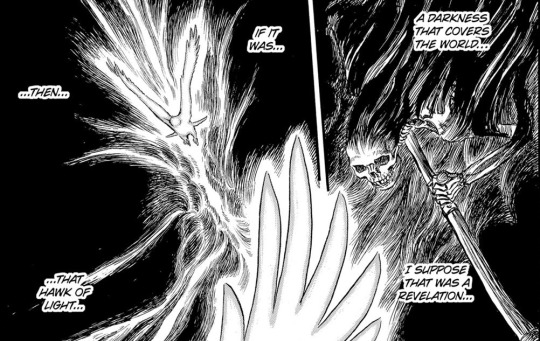
Dark shadow, darkness that covers the world, thick darkness, utter darkness, etc etc. It’s not subtle, and it’s pretty clearly the intended follow-through to Slan’s words and Farnese’s prophecy. The Conviction Arc shows us the world that’s shitty enough to motivate humanity to will a saviour into being.
Also while Age of Darkness sounds a little too impressive to be boiled down to a measley 2 years that suck extra hard, I’d argue that this is more like the straw that breaks the camel’s back. Plague and famine etc just draw into sharp relief the divide between the have and the have-nots, which is largely what the Conviction Arc is about. It’s about nobility terrorizing peasants through the Inquisition, and neglecting peasants as Laban muses that the King is too obsessed with trying to find Griffith to allocate resources to relief efforts, and how much this fucks the world up.
The Conviction Arc shows us a pretty good example of a world where darkness, ie wickedness, hatred, hostility, the dead, and illusion (I’d argue Mozgus’ brand of religion, especially with how much fun the narrative has with painting it as super fucked up and hypocritical etc, like God’s love being a torture chamber, fits that bill) covers the light.
And it’s the kind of world that Femto requires in order to be incarnated physically.
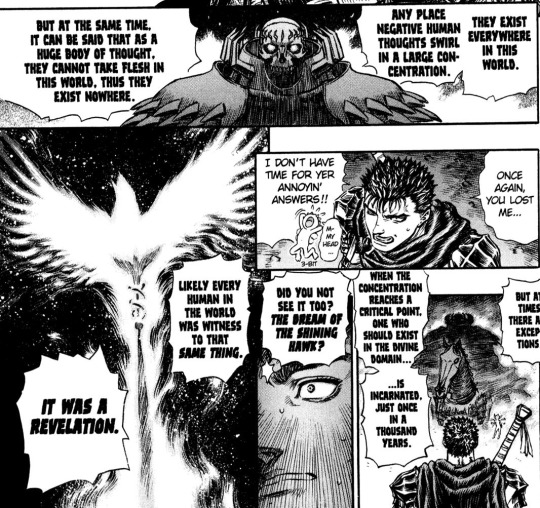
So whether the “Hawk of Darkness,” directly caused this “Age of Darkness,” or whether it’s more like, yk, humanity/fate caused it itself because humanity’s negative emotions reaching a critical point allows him to incarnate and change shit up as per humanity’s desires (this is all there in the Lost Chapter), I’d stay it fits the prophecy. Femto = Hawk of Darkness = Age of Darkness = all the darkness of humanity emphasized.
But this gets muddy once NGriff does show up and we get the sequence where his apostle captains meet him etc:
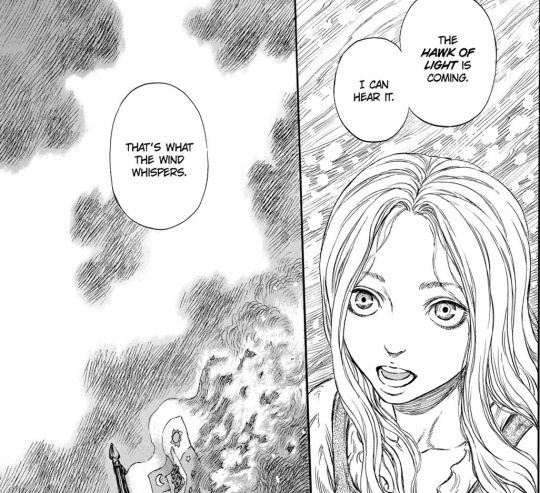



Like okay, so Schierke’s maybe just reciting the old prophecy, since it’s the exact same wording Farnese gave us, so maybe this doesn’t change what we were lead to believe was the Age of Darkness? I mean at this point we’d be still in the midst of it, going by what was stated in the Conviction Arc. The future tense could just be because it’s an old prophecy.
But the future tense is there (and I double checked with a scanlation lol, and it was there in that translation too, so I’m assuming it’s part of the original Japanese wording), and it’s worth considering that this is still meant to be foreshadowing and the Age of Darkness is yet to come. In which case it would presumably be Fantasia.
So one possibility is that the Conviction Arc is either a giant Age of Darkness red herring or it has been retconned out of being the Age of Darkness, and we’re meant to understand Fantasia as the prophecized Age of Darkness brought down by the Hawk of Darkness.
I’m not fully on board with this possibility because a) the Conviction Arc was pretty damn straightforward and made perfect sense as the AoD and I hate retcons, and b) Fantasia is defined by light lol, not darkness. Both literally in that a bright white light envelops the Earth as it changes and it’s often described in terms of light, and figuratively in that I’d suggest every one of Slan’s examples of light up there (love, hope, etc) is illustrated in the nature of Fantasia. Humanity joining together despite differences including apostles, hope, astral planes merging (which I’d argue makes the world more real, not less), the living (NGriff’s funeral services make people more at peace with the idea of death and able to emotionally recover from the loss of loved ones much easier), and I’d also argue that this chill easy going accepting version of organized religion we’ve seen fits the ‘sacred’ bill a lot better than Mozgus’ horrific version.
Admittedly you can argue the opposite for some of these points, like maybe Griffith’s funeral services making people more cool about death is a bad thing and an example of death eclipsing life. Maybe the astral plane is supposed to be more illusion than reality. Maybe we’re eventually going to see hostility and hatred in the world outside Falconia. Hell, maybe the Sea God slog was meant to be indicative of the ~darkness~ (and to be fair I did not re-read much of the sequence to try to find examples of the narrative evoking darkness as a description, so it could be there. But it’s gonna take more than an anon ask to get me to re-read the entire Sea Sea god subplot lol.) But even from Guts’ perspective the joining of the astral plane also includes wholesome Elfhelm-y shit, so it’s still not as simple as evil sea gods and monsters now getting to fuck shit up, we also get helpful mermaids and stuff.
So yeah so far given what we know, the pre-Fantasia world fits the description of the Age of Darkness perfectly and really heavy-handedly lol, with all the references to darkness involved, and Fantasia is a lot less clear-cut.
So the way I’d interpret this prophecy is that Griffith is both the Hawk of Darkness and the Hawk of Light, which imo is likely to be in part an on the nose reference to Femto as his inner darkness vs NGriff who does, in fact, save the world in a way characterized by light lol.
And which one you see him as depends on your point of view. It’s not that Sonia is wrong and being tricked and Schierke is right and sees the truth. It’s that Sonia, living in the Age of Darkness, losing her parents and almost being enslaved etc, and being saved by Griffith, is in a position to see Griffith as a saviour, along with most of the rest of humanity, which was collectively crying out for a change that Griffith’s dream and goals in particular are suited to enacting.
Schierke, distanced from humanity, not actually in danger of being burnt at the stake or starving to death or whatever, and more knowledgeable about the astral plane, sees Griffith as the Femto-y Hawk of Darkness, king of the blind white sheep (his human followers, one presumes), master of the sinful black sheep (apostles one also presumes).
And the fact that this chapter doesn’t end on Schierke’s assessment but on Sonia looking on at Griffith in awe, followed by yk 150 odd chapters of NeoGriffith being portrayed as the protagonist of his half of the story rather than the antagonist of Guts’, followed by seeing those “sinful black sheep” and “blind white sheep” up close as interesting and likeable characters in their own right who go out of their way to help people (Sonia rescuing Kushan children, later apostles helping humanity, eg), make friends with some of Guts’ rpg group including Schierke, at one point join Guts and co in a fight against a greater enemy while being directly paralleled to Guts (Zodd), etc suggests that maybe that particularly harsh description is not fully accurate or fair.
If Fantasia does turn out to be the (an?) Age of Darkness after all, I imagine that would also be depicted as a more dual thing depending on your perspective. For those getting eaten by dragons, yk, maybe Age of Darkness is a fair description. For those living in peace, maybe it’s not.
Also as an aside, to address a counterpoint I just came up with lol, I don’t think the relative tininess of Falconia vs the rest of the world has much bearing on this. Miura’s Berserk is pretty solely focused on this one particular chunk of the world, and there’s virtually no acknowledgement that Midland and the surrounding area is actually just a tiny microcosm of the world. I mean, the Godhand and the Idea of Evil are presumably not solely the manifestations of fantasy Europeans’ negative subconsciousnesses, but it’s their suffering and their inequal society that allows Griffith to manifest physically. No acknowledgement as to whether like, the wildly different societies throughout the world, some of which are probably more equal and less hit by plague and famine, and therefore more content, should counterbalance all the suffering in Midland and area lol.
To me this feels like a pretty typical issue/trope with medieval fantasy that Miura’s just kind of casually playing into bc he doesn’t particularly care about subverting it or making a point about it so much as he cares about using this established structure to tell his own story. Even during the Fantasia montage, we only saw medieval pseudo-Europe. The lone acknowledgement that the world is technically bigger than a stretch of land between Midland and fantasy India (+ Elfhelm) was the page of the bright light spreading across the Earth as seen from space. And like, a secretive conversation between 2 of Guts’ current allies (Magnifico and Roderick) discussing the possibility of colonialism lol.
Again, maybe we’ll see acknowledgement in the future? Maybe eventually the narrative will come out and say that yeah, it’s absolutely absurd to think that a happy kingdom whose residents number in the thousands is a beacon of hope for 99.99% of the world that has no way to get to it lol and is presumably, in theory, stuck with their own dragons and stuff now. Maybe Berserk will ultimately turn out to be a giant thoughtful subversion of European-esque fantasy stories that treat Europe as the centre of the world. But based on what we’ve seen so far I don’t think there’s much reason to assume that lol.
Like even the Elfhelm warlocks don’t point that out when they had the perfect chance to, they just say that it sucks that Griffith made his kingdom the only peaceful place, forcing people to choose between Fantasia and Falconia. They don’t say that the vast majority of the world doesn’t even get access to that choice lol, and so I don’t think it’s meant to be relevant.
I also want to point out that Miura redacted the Lost Chapter because it gave too much away too soon, and has since spent some time hinting about things those of us who’ve already read it probably know.
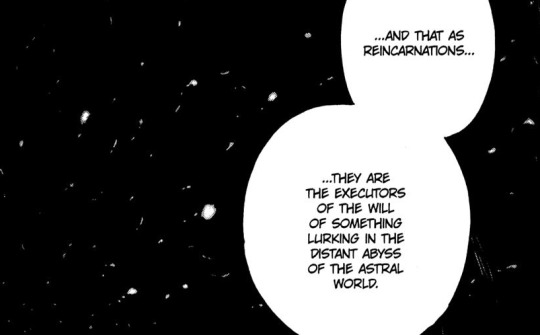
Like Flora doesn’t know what that something lurking in the abyss is, but we do, and it’s humanity’s dark, painful subconscious itself.
Griffith is essentially the avatar of humanity, hence why he’s humanity’s “desired,” and is remaking the world in humanity’s collective image. And like humanity isn’t all good or all evil but contains both, so does NeoGriffith, imo. Even the “Idea of Evil” isn’t evil itself, it simply fulfills a role humanity desires - the role of villain, essentially. It’s the reason why bad things happen, it’s the scapegoat for humanity.
The Hawk of Darkness is symbolic of the darkness of humanity - and that’s pretty much the point of Femto, I mean just check Slan’s heavy-handed Eclipse commentary of “this is what it means to be evil. This is what it means to be human” - and the Hawk of Light is symbolic of at least the potential humanity has to overcome that darkness, imo.
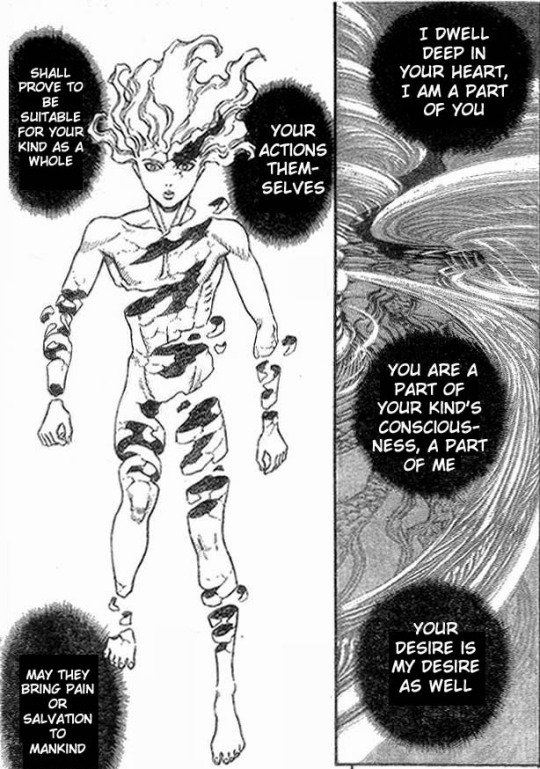
I’ve always puzzled over pain vs salvation there, and I still do, but hey one possibility is that it’s a suggestion that humanity’s over the Idea of Evil being the scapegoat that brings them pain (fate making bad things happen basically, so humanity has something to blame), and wants it to bring them salvation instead - light. And through NGriff’s transformation of the world, humanity reaches that light themselves by uniting in peace to survive against their own demons. Even outside of Falconia, humans are only going to be able to live in a world full of fantasy monsters by uniting together lol.
And like until I’m conclusively proven wrong I’m going to maintain that
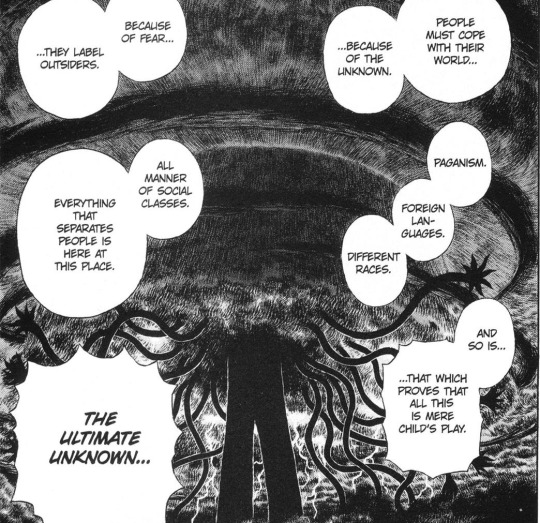
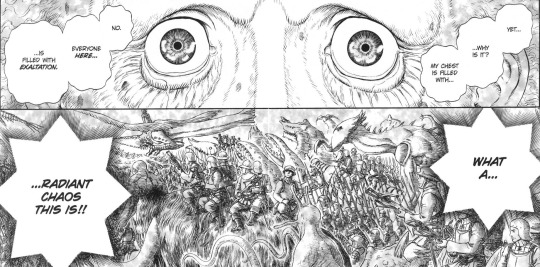
Fantasia being defined through joining humanity together is pretty solidly framed as a positive thing. Maybe humanity working together in peace is light and salvation, love over hate, hope over hostility, reality over illusion (the ultimately meaningless differences that divided people), etc.
SO I guess at the end of the day what I think is that Griffith is simultaneously the Hawk of Darkness and the Hawk of Light, that while Fantasia has some downsides to say the least lol we’re not necessarily supposed to take Elfhelm Warlock dudes’ assessment as the be all end all either. We’re getting 2 sides to this utopia story and we’re probably meant to judge for ourselves whether it seems worth it or not. Schierke would say no and prioritize the darkness of Griffith, ie the Hawk of Darkness, Sonia would say yes and prioritize the light, the Hawk of Light, and neither are wrong. But idk, maybe both might be able to grow from seeing the other’s point of view and incorporating it into their own understanding of the world.

I’m also thinking this dark vs light stuff is going to come into play in a big way when Guts and Griffith confront each other, and I imagine that their relationship is actually going to get the final say in all this. Hate or love, hostility or hope, illusion or reality, the dead or the living, wickedness or sacredness. Does this not to a tee describe them post Eclipse vs pre Eclipse?
Maybe if the Age of Darkness is still to come afterwards, they’ll end up plunging the world back to its original status quo when they conflict and kill each other or whatever, and take Falconia/the world tree/whatever down with them. Maybe NGriff’s unfrozen heart will come into play as the final piece of the thematic puzzle if the Hawk of Light represents the light of humanity, which ofc includes love. Maybe all it will take to conclude the themes in a satisfying way is a moment of understanding of that “true light” between them, discovered in darkness, while they fight.
Like you’ll pry my reading of Berserk’s themes as consistently and thoroughly existing to symbolize Griffith and Guts’ relationship out of my cold dead hands lol.
Fuck sorry this got so long and meandering. What did I say about trying to keep my thoughts organized lol?
Anyway tl;dr I don’t know shit and I don’t think the world of Berserk actually makes much sense, but let me throw out some theories and interpretations of possible contradictions and weird ass world building lol. And I mean, Miura is pretty consistent in interviews about saying Berserk isn’t about plain old good vs evil, so it wouldn’t surprise me at all to get something more complex and interesting than “Griffith is the evil Hawk of Darkness tricking humanity into seeing him as the Hawk of Light, and Guts is going to save the world from him.”
OH SHIT AND I ALMOST FORGOT: I have no idea where Schierke calls Griffith “false,” so you’ll have to point that part out to me, unless it’s just a difference in translations or something. Sorry I can’t address that part, hopefully you’ll at least scroll to the end and see this even if it’s super tl;dr lol.
#Anonymous#ask#a#berserk meta#b#lost chapter spoilers#theme: fate#character: neogriffith#theme: true light#theme: morality#berserk is a lot of things but it's not overly simplistic i'll give it that#theme: spirit world
25 notes
·
View notes
Text
Watamote Analysis Pt.2: More Than SAD?
Alright, so a quick overview: in my last post regarding Watamote (Watamote: An Intriguing Perspective On Social Anxiety), I discussed how many of the situations in Watamote, as well as the traits of the protagonist Tomoko Kuroki, indicate that she is suffering from Social Anxiety Disorder. This is a disorder that is characterized by extreme avoidance of social situations and people, to the extent where it is also considered “social phobia”. If you want to understand this concept more in depth, you can read my previous post, and there are many online resources that can provide more info- I recommend https://adaa.org/understanding-anxiety/social-anxiety-disorder as a great starting point, where I found many of the statistics and verified the information used in my last post.
Anyways, in this post, we will be continuing from where we left off. At the end of the last post, I acknowledged that while SAD seems to be the most plausible diagnosis for Tomoko, some other sources and discussions I came across online while researching suggested that she could be suffering from ASPD (anti-social personality disorder) or BPD (borderline personality disorder), either alongside SAD or alone. Both are widely associated with psychopathy and sociopathy, respectively. To begin, let’s first distinguish the differences and similarities between both. I will add that much of the information on these I’ve gathered is from notes from my abnormal psychology class, so I do genuinely believe it’s reliable- the rest will be in the list of sources.

Anti-social personality disorder, according to the Diagnostic and Statistical Manual of Mental Disorders, 5th Edition (DSM-5), can only be diagnosed after the age of 18- However, signs of it may emerge from around the age of 15 (defined as conduct disorder). Therefore, while she may have some traits of an ASPD affliction, it is already unlikely that Tomoko canonically suffers from this. Even though her age is never directly stated in the anime, she attends high school, implying she’s a teenager. Regardless, for the sake of the article, we’ll discuss some of the characteristics that classify it as its own diagnosis:
- Many behaviours of an individual with ASPD notably indicate a great focus on oneself, regardless of morals or ethical implications. Since they exclusively focus on themselves and personal gain, others are no more than pawns to use and aid them in their own pursuits. True intimate relationships are usually nonexistent due to issues with empathy and a general carelessness for others’ feelings. It is worth noting that, while all psychopaths are narcissists, not all narcissistic individuals exhibit behaviours of a psychopath.
- Generally, they are manipulative liars, which ties into the above statement that they view others as “pawns”. They use their charm and wit, which they normally learn through observation of others, to convince others of their trustworthiness and integrate into society.
- Normally, lack of remorse and impulsivity lead to criminal activity in these individuals. Irresponsibility and failure to learn from their mistakes is also commonplace.
BPD, on the other hand, does not have an age requirement to warrant diagnosis. It has been argued that, while Psychopathy/ASPD is within you from birth, despite the 18 or older diagnosis rule, Sociopathy/BPD is developed during one’s life. Some symptoms of it include:
- Fears of abandonment or rejection. May push the individual to threaten self-harm or suicide.
- Unstable opinions of people and self-image or identity, such as shifting values and thoughts on others (which can intensify the above fears). Moods are also unstable in these individuals, and they often experience intense mood swings.
- Paranoia caused by stress and losing touch with reality.
- Impulsivity, recklessness and irresponsibility (one symptom BPD shares with ASPD).
So, does Tomoko fit the bill for either of these?
I mentioned that narcissists and individuals with ASPD share similar self-centered behaviours. Tomoko does focus on herself, and appears to search for pity and validation among her peers, which narcissists tend to do. One instance that is frequently referred to to justify this argument is the scene in which she claims she has been “raped” to Yu, after hearing other girls in her class have been molested and feels left out. It can be interpreted as a way to exploit Yu’s friendship and get concern and pity from her- I, personally, just see it as another manifestation of her desire to fit in and be like her other peers. It is worth mentioning that, either way you interpret the objective of these questionable actions of her’s- whether fishing for pity or attempting to fit in, both would be indicative of ASPD. It’s a form of manipulative lying, as even if it doesn’t blatatly have any benefits for her, it provides her with some emotional gratification, either through a feeling of belonging or by offering the pity and concern she yearns for.
And that leads to another aspect of Tomoko’s personality worth contemplating-despite her undeniable disdain of her peers, she desires to be like them. I believe that a large part of this disdain towards other girls is actually jealousy, whether she realizes it or not. She attempts to be like them on multiple occasions, and fantasizes about being pretty and popular (although in her mind, this means being a “bitch”, solidifying her grudge/jealousy against other girls). In fact, a small part of her even seems to consider Yu a “bitch”.
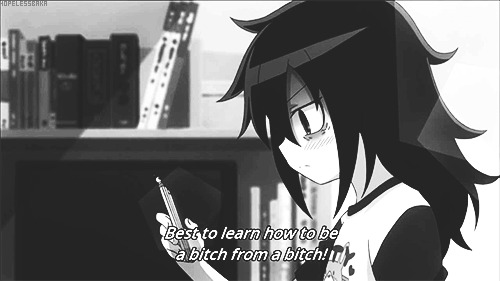
While being arrogant doesn’t always indicate ASPD, it is certainly a symptom, on account of the fact that it heavily ties into narcissism. Again, narcissism doesn’t automatically mean psychopathy- but in this case, it seems it would tie into something greater, since she actively lied and used her closest friend to feed her narcissism.
This arrogance may be a coping mechanism of sorts, a way to help her accept that she is not like them (”who would want to be a basic bitch?”), but her constant cognitive dissonance and changing opinions are indicative of BPD. As I mentioned above, instability in feelings towards people and situations is one of the . Some days, she hates the girls around her, other days she wants to be them. With Yu, Even though she’s a “bitch” like the rest of them, she appears to admire her beauty and popularity (ironically the key things that make her a “bitch”), and sometimes it’s even hinted at throughout the series that she has a crush on her.


*Side note: grabbing her butt is a very impulsive and reckless thing to do, as she isn’t considering Yu’s reaction or the consequences it may have of their friendship.
Finally, Tomoko demonstrates the paranoia characteristic that is typically associated with BPD. Much of her stress and social anxiety is likely caused by SAD, but this stress undeniably worsens her paranoia. Consequently, she will lose touch with reality as the fear overtakes her- after all, even neurotypical people can drift off and begin to think up ludicrous situations when they’re extremely stressed. This losing touch with reality is VERY different from fantasizing, though, which she does often as well- daydreaming is not necessarily losing touch with reality. For instance, she sometimes daydreams that she has the looks of a sexy centerfold- but will eventually break out of this fantasy and realize she is herself again. Meanwhile, when in a state of panic, it is difficult for her to rationalize and think about the situation, more-so than for most people. In the infamous train scene - which is what leads to her “confessing” to Yu that she had been raped- she fears that she is being molested on the train when she feels something long and hard poking underneath her skirt. She nearly goes into hysterics. Even if she doesn’t blatantly show her fear until the end of the predicament, her internal monologue reveals her utter horror throughout her train ride.
In reality, in just ended up being a schoolgirl’s stick (I’m unsure if it was a broomstick or what, honestly, but it was a long stick). Not a molester. In her defense, she doesn’t know what a penis feels like, but anyone in this situation probably would have been able to reason their way to the conclusion that it wasn’t. Tomoko jumps from conclusion to conclusion, letting her unrealistic thoughts feed her paranoia and fear.

In conclusion, I certainly think Tomoko suffers from Social Anxiety Disorder- there is no doubt in my mind about that. However, after doing some extensive research, I think it’s also plausible that she has Borderline Personality Disorder. While no trauma or particular cause of the emergence of BPD is shown in the anime, there is a flashback of her as a child in one episode, where she seems like a normal, pleasant child, which leads me to believe the wasn’t always like this. ASPD is not only something you inherently possess, but it seems a little extreme for Tomoko- I feel like she would feel guilt if she were to seriously hurt someone, or at least worry about the consequences afterward (even if her impulsivity prevented her from thinking about this beforehand). Her ever changing internal monologues regarding the things around her, as well as frequently becoming paranoid and losing touch with reality (which I think is worsened by her SAD) are all indicative of BPD. So, yes, I agree that she suffers from SAD and BPD- but not ASPD.
Sources:
https://www.verywellmind.com/the-diagnostic-and-statistical-manual-dsm-2795758- A resource I added for those who are unsure what the DSM is.
https://www.youtube.com/watch?v=6dv8zJiggBs- A helpful video to distinguish between Narcissism, Sociopathy, and Psychopathy with Dr.Ramani Durvasula.
https://en.wikipedia.org/wiki/Antisocial_personality_disorder Extensive notes on ASPD, good for anyone who wants to do further reading.
https://www.mayoclinic.org/diseases-conditions/borderline-personality-disorder/symptoms-causes/syc-20370237 Extensive notes on BPD, for anyone who wants to do further reading.
My class notes from Psychology and Abnormal Psychology classes, which I have used to validate the info found in the above sources (with the exception of the DSM 5 definition and the youtube video).
* Cognitive Dissonance: In the field of psychology, cognitive dissonance is the mental discomfort experienced by a person who holds two or more contradictory beliefs, ideas, or values. This discomfort is triggered by a situation in which a person’s belief clashes with new evidence perceived by the person. (Definition copied from Wikipedia.com).
#watamote#watashi ga motenai no wa dou kangaete mo omaera ga warui!#yu naruse#tomoko kuroki#tomoko#anime#psychology#analysis#mental illness#borderline personality disorder#bpd#aspd#anti social personality disorder#psychopathy#sociopathy#social anxiety#social anxiety disorder#anxiety#stress
6 notes
·
View notes
Text
WORLDVIEW
Related Texts
1 Cor. 2:16; 1 John 5:20; 2 Tim. 3:18; Psalm 53:1-2
“In God’s economy, egalitarian is about people. We are all equal before Him. Elitism is about idea. Some ideas are wrong and needs to be dealt with. What happens in the counter cultural worldview is they make people elitist and all ideas egalitarian…”[i]
-Ravi Zacharias
Opening and Introduction
Worldview is a person’s interpretation and perception of reality that signifies a certain measure. Everyone has a world view and one may have the capacity to articulate it or not. A person may even have mixed worldviews that he/she may not be aware of.[ii]
The world has numerous worldviews and there is an existing battle of worldviews carried out through various institutions and avenues of society and religion. Worldview is where an individual derives his/her own conviction and interpretation of reality that appears to be coherently plausible.
Analogy of the reading glass: Reading glass helps the eyesight read clearer. This must be in relation with the eyesight and the grade of the lens. Poor match up would not provide the function of letting the person in need of the eyeglass see clearer. Worldview is the lens in which we see and interact with reality.
Christian apologists Norman Geisler identified that there are 7 types of worldview, namely[iii]:
Atheism (affirms the non-existence of God)
Polytheism (many finite Gods)
Panentheism (God has two poles, the actual and the ideal – God is in the process of being perfected)
Pantheism (impersonal God – all is in God)
Deism (God has created but left creation to function without God’s intervention)
Finite Godism
Theism
However, this can be further subdivided into three general families. According to Os Guinness, the major divisions are the Western, the Eastern, and the Secular views.
This proves that there are plenty of worldviews. General Worldviews extend to have offspring that manifest of of their subsequent character. These include philosophical and religious elements as extensions and possibly conclusion of such worldviews.
The case of “postmodernism”
Postmodernism is a view that says “what is true for others may not be true for some.” This highlights individual story and relativism that centers on individual experiences or personal truths which stems from existential thinking.[iv] However, when a person sees himself/herself the center of meaning, this would only lead to despair. It is acknowledged by theologians that a person cannot be the source of meaning for himself/herself.[v]
Discussion
Worldview is:
Influential. It can be acquired and at the same time it can be transferred.
A person has the task to check what kind of worldview one is to accept or to reject. Usually this impartation happens in close knit surrounding such as the initial inputs of immediate institutions to the individual like family, religion or media. If a person is concerned with the proper development of positively good worldviews, then one must find lessons to learn from proper influences pertaining to good virtues, and credible beliefs.
Formational. It is formed in the individual and it forms the individuals.
It molds the individual with its deepest affirmations that becomes the foundation and principles which will be the guide in dealing with aspects of life. Formation takes place as individuals catch on and sustain perspectives based on notions that makes one adhere or adjust in a way that seems possible. It is not plausible to cater unfitted pieces to form fittingly together. Full formation must have a holistic view that fits reality.
Operational. It is identical with its manifestations.
The lifestyles portray the kind of worldview being held in relation to cultural and social norms as culture and social norms may provide vehicles for its expression. Incoming experiences are processed and contradictions or non contradictions to it in personal affirmations yield to certain reaction. Worldview attends the person on their values and the kind of worldview embraced by the person will eventually be carried out. The person being true to what he/she holds as principles will be the principle’s main advocate, whether he/she is conscious or not through the manifestation of words and actions.[vi]
Consequential. It gives affirmations that can lead to a correspondingly meaningful or tragic condition.
Since worldview is the core on how a person relates with reality, when it is applied and operated, it produces results and effect. Eventually, the fruits of the worldviews being operated will be ripe and this can affect a scope larger than just the individual. If worldviews have presence from the outset in the outcomes of actions (that they be acquired and carried out) – whether valid or invalid – then their effects are real.
The Christian Worldview
The Christian worldview is just one of the worldviews and it must have something that is can stand on as the most viable worldview that a person can accept. Theism is the Christian worldview.
Corresponds to Reality. The Christian Worldview corresponds to reality without violation on how human and non human condition is interpreted, evaluated, treated and affirmed. The Christian worldview tackles issues and elements in life that adheres to what can be experienced and known.
The Christian Worldview affirms the Biblical God is the primary cause of all creation and through His power, creation is sustained. The Christian worldview affirms God to have concern for Creation and intervenes in human history by revealing His fullness in the person of Jesus Christ. This is the work of grace for the salvation of humanity from fallen condition and judgment due to sin, which extends for the redemption of creation affected by the curse of sin of humanity(Cf. Romans 8:19). In this worldview, God has given us the highest compliment without putting humanity at the highest center[vii] and this comes with responsibility for the dignity of one another and creation.
Coherent in its Assertions. The Christian Worldview is consistent with its elements as part of its over-arching claims.
A noted Christian apologist Ravi Zachariah asserts that there are ”four fundamental questions that every religion seeks: origin, meaning, morality and destiny” and that “only the answer of Jesus corresponds to reality. There is coherence among his answers unlike any of those Religions.”[viii] The Christian worldview provides meaningful reflections of different areas of existence whether temporal and immediate, and God is the only one suitable basis for life and purpose.
The Biblical God differs from gods of other worldview since the Biblical God is infinite, perfect and personal God who reveals God-self while other worldviews provide a finite, imperfect, aloof or impersonal view of God or even the non-existence of God. Worldviews that affirm a certain god or multiple gods which differs from the theistic affirmation of God provide a finite, imperfect and even impersonal “God/s” which cannot be ultimately God at all. The Christian Worldview differs from deism since the Biblical God is a God who intervenes with human history through self-revelation and through creation. In the case of atheism, there would be no strong basis for the foundations of morality, the sacredness of life, and the purpose of creation. Therefore, in an atheistic worldview, ideals become based on what people think and not on what God says.[ix]
People who have mixed worldviews who claim equal validity of every other worldviews for toleration and accommodation is characterized as syncretism,.[x] Syncretism will dilute the message of the Gospel,[xi]so in the end this would prove to be false since it will not do justice for contradictory claims from different religions or worldviews to be equal or the same with each other without compromising their foundational essentials.
Reasonable on its foundation and pursuits. The Christian Worldview includes reason for the objectivity of its faith and it makes proper use of God given gifts for holistic progress.
One of the God-given gifts to humanity is the rational process. Faith must be objective and it must not betray proper reasoning. This has been the affirmation of numerous Christian thinkers, apologist, writers and serious believers. The affirmation of God doesn’t stop us to know more about the facts and reality of life. Instead it is there to push humans for further examination of their world.[xii] God given capacities and capabilities are encouraged to be used within the limits of proper stewardship. Through-out history, Christians has contributed to the progress of social laws, scientific endeavor and the arts – both musical and literary. [xiii] It could also come to mind that Christianity has contributed educational progress – many outstanding universities were formed from Christian roots – through Christian mission with the attempt to spread the Gospel.[xiv]
Relevant in its implications
The Christian worldview gives discernment on what is ultimately good and gives courage to call evil for what is, since there is a moral standard, having God at the highest center. Within this worldview we can find the sacred basis of life where human functions within God’s intended purpose as both human and non-human worth are properly acknowledged.
When the horrors done in the name of Christianity are used to attack the Christian faith, we are assured that those horrors are done against the Christian tenets. The horrors done in the name of Christianity are done not in accordance with its message but by people acting out against the values and virtues upheld by Christian morals, though they want to carry the name Christian. But when horrors are attributed in the name of atheism, then it only acts out what that worldview has rationally accepted to do.[xv],[xvi] There would be no moral strongholds to restrain actions . On the other hand, other worldviews attempts to portray the problem of evil to be just an illusion, especially for some eastern religions.[xvii]
History acknowledges the impact of Christian people on social aspects as they carry out their convictions based on their faith – such as advocating civil rights and demolition of social oppression.
Closing and Application
Are there contradictory elements in you deep-seated personal beliefs?
Is it okay (possible) to affirm the non-existence of God and existence of God at the same time just to be on the safe side? Why?
[i]Zacharias, Ravi. Chapter 12: “America’s Liberty on the Crossroads” interview by David Limbaugh. Persecution. Harper Collins.2004. p.343
[ii] Barna, George. Think Like Jesus. Integrity Publishers.2003 p. xviii, 5
[iii] Geisler, Norman and Victor Brooks. When Skeptics Asks (A Handbook of Christian Evidences. Victor Books. 1990. p.36
[iv] Barna.p.35
[v] Tillich, Paul. The Courage to Be. Yale University Press.2000.
[vi] Conversation with Ptr. Jonavern Lungub. 2009.
[vii] The writer attributes this from the Christian apologist Ravi Zacahrias. For more of Dr. Ravi Zacharias expositions, visit www.rzim.com. There are also excellent videos onwww.youtube.com for defense of the Christian faith.
[viii]Zacharias, Ravi “Objection #5: It is Offensive to Claim Jesus is the Only Way to God” interview by Lee Strobel. The Case for Faith. Zondervan Publishing House. 2000. p.151
[ix] Colson Charles. Tough questions About God, Faith and Life. Tyndale House Publishing. 2006. p.50
[x] A good discussion of this can be found in the section “America’s Liberty on the Crossroads” of the book Persecution by David Limbaugh published by Harper Collins, which is a short interview of Christians prominent in Christian worldview.
[xi] Bong Rin Ro. “Contextualization: Asian Theology.” What Asian Christians Are Thinking: a theological source book. Ed. Douglas J. Elwood and Emerito Nacpil. New Day Publishers, 1976. p.57.
[xii] Ward, Keith. Why there Almost Certainly There is a God. A Lion Book.2008. p.66
[xiii] Colson. p.120-123.
[xiv] Kennedy, James and Jerry Newcombe. What if Jesus Had Never Been Born? Thomas Nelson Publishing. 1994. p.40-56
[xv] Colson.p.118-119
[xvi] Aikman, David. Delusion of Disbelief. Saltriver. 2008. p.96-97. The author allotted a chapter which gave a good discussion on the historical consequences based on the atheistic worldview.
[xvii] Geisler.p.43-44
1 note
·
View note
Text
Thoughts After Reading an Émile Durkheim Excerpt for a Course

One of the things I enjoy about Durkheim so far is the way he uses notions of both space and time to analyze society. It is rather ingenious. It does seem like the density and number of nodes on a social network have an effect on the way time is socially experienced across the network, as well as other features of society and how individuals experience society. Put in other terms, Durkheim links network topology (looking at a network as a geometrical object that can experience displacement of its components while preserving certain properties) with social ontology (the social being of the individuals that form the nodes of the given social network). I’d like to expand on this insight, since so far at least Durkheim is not incredibly clear about his reasoning process from quantitative population measures and network size to qualitative differences in solidarity. What he does make clear is the relationship between qualitative differences in solidarity and the sophistication of the division of labor. It is this which makes me not fully buy into Durkheim, and, I think, if I go over why this doesn’t make me buy into it in detail, it may reveal this comes from some of my sympathies for Marx.
So maybe I should think abstractly about social networks for a moment. For example, if you have millions of people you socialize with, each of whom know at least a subset of those who you socialize with, even if its to varying levels, one can say that your social network is “high density.” Perhaps we could measure density in terms of how often network links intersect with each other, and thereby how many times an intersection must happen (wherein the intersection is not yet another individual, and is thus not a node insofar as nodes are specified to be individuals in our analysis here). Or, perhaps, in terms of how many links are likely to radiate from any given node in the network. In any case, a high density network is going to affect each node’s experience of time insofar as each node’s traits remain constant (or, more generally, to the extent that nodes are constrained in their use of resources and their rate of capacity to reproduce themselves before they’re completely spent out of existence). That is to say, a high-density social network would make agents in them experience a higher pace life since it may require them to divide their time, however disproportionately they may do so, and it would also make agents in them experience higher risk in decision-making. Both of these are because:
Each node has to divide their time in a way correlated with the amount of links radiating from them, leading to a loss of integrated social information by which to make decisions, increasing uncertainty about the general reception of their personal/social decisions;
Each given node is more saturated with information that is of personal relevance (whether negative or positive), which means that cultural symbols lose consistency of meaning across groups and the likelihood of miscommunication across social groups is thereby high. Society can here then be said, not only to “speed up” since social formations become more ephemeral/flexible with higher density, but higher density can also put pressure on nodes in the network to the degree that there may be an incentive to meet social status goals more quickly or as quickly as other individuals.
Yet, Durkheim’s interpretation of this breaks down right here. It’s not enough for society to be high-density, in order that it speed up or accelerate. This already presupposes a generalized social status factor that requires a high degree of competition, due to its object being scarce (whether naturally or artificially). This is not a given. An alternate possibility is for high-density networks to incentivize the growth of each individual’s capacity for manipulating abstraction as well as each individual’s capacity for metacognition (or, capacity for entertaining a multiplicity of perspectives/interpretations of behavior).
In the same respect, it could then disincentivize them from relying on fight-or-flight, fear, etc., as sources of problem-solving. This is because the necessity of these skills seem to be latent in the fact that those individuals have to deal with more complex social networking (although, again, this is mediated by status-seeking). Further, Durkheim seems to see this “civilizing” force as, in retrospect, promoting individuation (i.e., increasing the average uniqueness of traits across individuals). But he never asks whether this individuation is on the individual’s own terms; he seems to implicitly think so since his language for describing what happens in this individuation is that society leaves a space open for the development of individual powers. He doesn’t say that society produces that uniqueness. Rather, for Durkheim it seems to be a side-effect of the space left open, to members of society, for independent action. This way of characterizing it may be a bit naive, for if indeed society also tends to speed up or accelerate with this process, it’s not clear where Durkheim’s assumption of agency comes in. Is it not the case that agency may be decreased given a loss of huge amounts of integrated social information available to the individual?
Even Durkheim’s point about specialization and the division of labor may not be straight-forward if its justified only on the basis of properties of the network. To illustrate: The other property of the network we can look at in terms of space is the number of nodes in the network. It seems obvious that, since any given level of density in a social network is also constrained by the quantity of nodes/agents in the network, a high number of nodes/agents in society is necessary but not sufficient for high network density. What, then, is the more direct impact of a high population of societal members on that same society, if it’s not necessarily high network density? Well, with higher population, a higher range of differentiation is possible simply because there is a higher number of possible permutations that may act as variables related to particular traits that may be manifest in individuals, and because there is a higher variability of possible distribution of individuals in that society across a whole geography. Higher population, then, is likely to increase diversity.
However, here’s where Durkheim’s optimism falls apart a bit: Durkheim interprets this diversity to mean specialization. The previous point I mentioned shows this to be a non-sequitor, as the skills that a high-density network can promote may allow for incredible ease at multi-tasking, integrated application of different skills as a single person, and an over-all improvement of performance across various domains. While the level of skill or performance in some things would still be higher than others, other skills and performance can nonetheless be high enough that tasks requiring them do not have to be outsourced to other labor so that the given project undertaken is successful. The relevant variable being what “successful” is, but it will involve an average understanding of success by that society that may not need to absolutely emphasize productivity (output per unit time, in money or product) or efficiency (trimming of labor extraneous to the basic expected average use of the product).
Even if we grant that the domain-general skills a high-density socially networked society demands of individuals need not prevent specialization even if may make it less necessary in more general terms, there’s another issue with Durkheim’s assumption that diversity means specialization: he lumps, or conflates, all division of labor as essentially the same. This makes his parallel between the development of mechanical solidarity into organic solidarity, and the development of low specialization to high specialization, quite suspect, even if we take it to be a logical/ontological claim (a claim about one thing’s logical dependence on another, or one thing’s dependence on another for its existence) rather than a historical claim (a claim about what came first in a temporal order, in actual fact). How is it suspect?
Well, given what has been said so far, it seems reasonable to say that mechanical solidarity can hold, internally, a high degree of specialization if it is extremely strict, as all mechanical solidarity requires is that individuals in the society be highly integrated into performing a single function at the societal scale. We see this in some ants. What it can’t incorporate is a flexible and highly dynamic allocation of individuals into particular divisions of labor. Organic solidarity, on the other hand, could probably internally hold both sorts of division of labor. In fact, we see this in how some societies are constituted by some rather essential social conflict due to the disproportionate significance given to certain divisions of labor, or in how the production of a division of labor may be largely related to culturally specified roles more than they are necessary to the material provision or production of goods in more general terms (this role having material necessity only to the extent such a contingency itself affects the politics of distribution of wealth and of the distribution of the returns on production). On the other hand, if we see history in terms of forces of production, as Marx does, we can see how this “cultural contingency” is not entirely a contingency, but a matter of the relative development of the forces of production from one point in history to another given both scarcity and the inextricability of consumption from the development of unified culture out of inconsistent norms and values.
#sociology#sociology of knowledge#information theory#information science#cultural sociology#sociology of time#sociology of space#network theory#network topology#topology#social physics#Social Philosophy#social ontology#durkheim#émile durkheim
1 note
·
View note
Note
iyo when you write non-straight characters should you specify their sexuality/gender? I mean I'm personally a very 'not into labels at all' person for my own sexuality but support ppl who do find comfort in labels. but when I write I also tend to go toward the 'he just loves who he loves !!!' that sounded stupid but idk how to explain it.. so... like I was wondering why you feel strongly about explicitly stating someone's queerness instead of it being implied (at least u come off as that sorta)
i do definitely feel like that so!! i happen to have a lot of feelings about this so get ready for a Long Ramble. this is a precaution before ive even started typing i just know im gonna write a lot
i think before we start saying anything, we’ve got to acknowledge the difference between people who say that they dont like labels, and writing characters who Don’t Like Labels™. pointing out the problems of the latter is not a condemnation of the former. if someone rly doesnt feel like labeling their sexuality or gender, thats totally alright. the difference between these two is the person is a nuanced, multifaceted human being who may have lots of personal reasons for feeling that way, while the second is a fictional character that is Created and informed by cultural views of the creator. a person is not “created” by one single author and characters arent like…real living agents that have their Own Free Will, they are what their creators make of them. anyway i just feel like this is a rly important distinction that gets lost often!! i’m also more willing to look favorably on someone who self describes that way writing characters based on their own experiences, bc this perspective is inherently different from a straight person writing these sorts of characters. but moving on.
whats also important to understand, beyond writing characters, is how being openly not straight is shunned. queer people are not allowed to Exist as openly queer and they have not been allowed historically. even these days among people who consider themselves progressive, you’ll often hear that “its alright if someone is gay but do they have to shove it in my face all the time.” this attitude isnt somehow formed in vacuum, but created in a society that treats been openly queer as a taboo. we aren’t allowed to be open about our sexualities the way straight people are. we can’t acknowledge that we’re queer lest someone tells us to Stop Shoving It In Their Face (not missing the irony as we’re surrounded by 400 billboards of hetero couples everywhere). i dont wan’t to delve into other aspects of discrimination and get too off track here, i just want to focus on how being Openly queer is treated as a taboo, particularly among people who still want to call themselves ‘accepting.’ the only way society allows queer people to exist is if they never remind anyone, Ever that they are not straight.
this is Integral to understanding why the i Don’t Like Labels characters are so frustrating. the unwillingness to Explicitly talk about queer people carries over quite handily to media. the same faux progressive people that demand queer people never talk about being queer bc its Too Much Information, will praise queer coded characters that hint at their sexuality but never confirm it. the reason these characters are written is not to genuinely explore why someone might feel uncomfortable with applying labels to themselves, but to appease people who will accept queerness as long as they never have to acknowledge it. this way, u can court queer people interested in representation And people who might like the story but will be uncomfortable with explicit queerness. its an attempt for writers to cash in on peoples desires for interesting queer characters without ever actually fully committing to representing them. you dont get to claim to support queer people if ur also out there providing comfort for peoples homophobia. you cant have a foot in both doors.
describing queer experiences without calling them queer means that youre okay with this story as long as u dont acknowledge it as something Explicitly not straight and like…why?? why is it suddenly not okay when u take that bundle of experiences and use the word that theyre defining?? theres Weight behind using words like bi, gay, lesbian and if u reject them are u Really okay with lgbtq people? or are you okay with them Despite the fact that theyre lgbtq and not because you take into account theyre lgbtq. acceptance is not tolerating people Despite something, its acknowledging it and validating it as an okay thing to be. especially when it is something that historically Not been validated as okay. dismantling structural systems of queerphobia does not go about by ignoring queerphobia…shit this doesnt just fade away by chance, it takes active work. and part of this active work is Acknowledging Peoples Queerness As Something that is okay Out In The Open. the You in this isnt directed at you anon, just people who have these sentiments.
throwing vague statements like ‘they just love who they love’ Also creates this level of ambiguity. you might say “well why do u need the certainty when ur describing what is at the very least, something obviously very not straight” and to that i say youd be fucking surprised at how goddamn hard straight people will try to erase the queerness out of a character. like i’m going to use a game called life is strange as a example. i’ll give some background: in the game, the main character max can romance both chloe and warren. note that max is not one of those blank state wholly customisable bioware-esque player characters, she has a personality outside of the choices u make. anyway, the conclusion that is Logically drawn from this is that she is most likely bisexual. or at the very least in some way, not straight. and Yet i have seen discussions that say “she doesnt have a set sexuality it just depends on the playthrough so shes not rly a Queer Character.” even more than that, ive seen people that saw “well even in the chloe one shes not necessarily gay or bi maybe shes just Making an Exception for chloe bc their relationship transcends sexuality” and like ??? Why??? why cant she just be bi?? even when given a queer romance, why do u try and interpret it in a way that sets her up as straight?? ive seen people say “its not a romance its just something that Transcends Words” as if this is… mutually exclusive from being a romance. like… Why doesnt this happen when hetero relationships are depicted?? ive literally never seen someone say “u know, maybe hes not attracted to women and just Making an Exception so hes not straight” why dont u see people try to erase the romance aspect out of hetero romances by claiming their relationship is “Beyond Words.” this treatment is 1000% only ever afforded to queer characters. this attempt to play off romance as not rly romantic is only done to queer characters, even if its done subconsciously. people will Refuse to accept a character is queer as fuck if you dodge around it, because heteronormativity is so ingrained in every interaction that even obviously queer characters get filtered through this lens. the problem with this isnt necessarily apparent until u look at it within historical context, where queer people are repeatedly not allowed to be openly queer. these arent isolated incidents, but manifestations of the idea that queer people shouldnt ever be open about their sexuality. youve got to tackle the discomfort that people have with words like gay/lesbian/bi/etc
i think this particular character trope wouldnt bother me so much if it wasnt like… the only narrative ever present. time and time again, i have to see characters proclaim that they dont like labels while never once even hearing people breathe the word bisexual. if it existed alongside characters who were explicitly queer it would be less frustrating But its literally one of the few ways (semi positive attempts at least) queer characters are ever portrayed. this is particularly true for bisexual characters lmao like… yes…theres people who dont like labels…but theres also millions of bi people that just wanna see a fucking bi character Talk about being bi and all we ever get is a vague “i dont like labels” (that is often never explored further than that and treated as a throwaway line anyway). is creating characters who say that a genuine attempt to characterize someones struggles with labels or is it just a way to avoid saying the word Bisexual.
same with queer romance in media. its only ever Okay if u just hint at it- see dumbledore being gay. see- the korrasami thing (though i dont fault the writers for this bc they pushed hard for what they got, its issues with the network). why are queer people relegated to drawn out stares that May imply something while straight characters are allowed to get into explicit relationships. when u create ambiguous characters that May be interpreted as straight (even if youve really gotta stretch) ur prefer to maintain the negative “neutral” of the heteronormative status quo and allow homophobes to live with their views unchallenged more than u care about addressing queerness in characters.
its not a coincidence that we dont do this to straight romance or straight characters. this is particularly important for queer kids!! its good to see queer characters out there being openly queer. while me and u can often pick up on queer themes and narratives, a 8 year old is not going to get that. especially when theyve been conditioned to see straight romance as the only feasible choice. they wont realize the character youre writing is gay or bi or whatever Because they havent been exposed to the connotations we associate w certain phrases. its so important for queer kids to see queer characters Owning that theyre queer. its especially importantly to normalize words like gay or bi or pan. being gay is often Extremely hypersexualized (which is why so many people will tell u they dont care what u do in the bedroom bc they can only picture queerness is a sexual context) so when u Dont treat these words as things only adults can say, u help get rid of the stigma surrounding them. u help remove the idea that being queer is inappropriate for kids to hear about and that the only possible aspect to being queer is sexual.
anyway this has been Quite the Ramble but the point is that yes, we need to write more characters who are absolutely explicit about their sexuality and move away from the expectation that queer people need to create euphemisms to comfort homophobes desires to never hear about queerness.
#LONG POST#VERY LONG POST#man...u rly got me going#theres a lot of reasons why labels are important in the first place but man this is truly long enough as this is#i hope i didnt get too rambly and my point still stands i try to stop myself from going off on tangents#anon#ask
13 notes
·
View notes